#real life dr. hyde (without the crime)
Text
I'm sorry I haven't been super active on here! I'm grading my students' final assignments and trying to get them done at a reasonable time so that they can all get their course grade.
Anyway, who's excited for the GTAO DLC coming out tomorrow??? I have a few precious hours to start doing this before speed grading final essays starting on Wednesday morning.
No rest for college professors and students. My fellow college students: good luck, and take care of yourselves. ✨
*Suddenly realizes that most of my break between now and January will be comprised of planning for three courses and waiting to tutor students again.*
#personal#real life dr. hyde (without the crime)#gta online#gtao#I see I have asks and I want to respond to them but I want to respond with the care and attention they deserve!#I'm just a busy adjunct with zero job security trying to hustle in this post pandemic higher ed world
7 notes
·
View notes
Text
Just finished reading Dr. Jekyll and Mr. Hyde (it's shorter than you think) only to come to the conclusion that all the tragedies involved could've been prevented via gay sex.
To completely shelve the fictional addict to real life addict comparisons people often make of the narrative, I am serious when I say Henry Jekyll having gay sex could've stopped the creation of Hyde.
Dr. Jekyll is an educated christian, british, white man in his middle age who is both unmarried and childless. He's well off, and by well off I mean he could take a year's vacation to Germany without much issue if he wanted. However, he's tired of his safe life and uses Hyde to embrace a darker, evil, and bestial side of himself. He wants to traverse around town in this state as he pleases but also mostly be left alone during this.
Two big reputation killers and scandal causers of the 1800s was murder and sodomy. Like sodomy was really bad unless it was treated extremely under the table. A wink wink nudge nudge if you know you know type of situation unless you didn't mind uplifting your entire life to move to a different city or country with the hope the rumors don't follow you.
If Dr. Jekyll with his scientific and social standing were to suddenly employ a handsome young man of good standing and countenance as an apprentice no one would bat an eye. The young man could travel to and from Dr. Jekyll's home freely and could also be summoned whenever there was something new to be "taught or studied". Whatever strange noises occurred behind closed doors could be brushed off since Jekyll is a chemist and they work with so many drugs.
Henry Jekyll could in secret engage in these sinful, "horrible", and pleasurable acts to satisfy the perceived evils within his heart. He could take his apprentice out to events or dalliances with colleagues and get a thrill from knowing the true nature of their relationship and his connections being none the wiser.
Another layer of secrecy is added because if the apprentice were even to consider blackmail by revealing the nature of their relationship, he'd be caught within his own trap of the sodomy crime. Besides, it's more likely he wouldn't as Henry would write in his will to give all his shit to his apprentice in the event of his death or disappearance. And I can make this assumption because in the book he gives all his money and possessions to Hyde and then rewrites it to give his stuff his lawyer. If that man had any estranged family, they weren't getting shit from him.
Not to "men be fighting demons and those demons is bisexuality" this theory, but the post nut clarity that comes with gay sex would not have only fixed Henry Jekyll, it also might've paved the way for some advancements in medicinal drug use.
#jekyll and hyde#dr jekyll and mr hyde#henry jekyll#literature#book tag#<-new tag since I'm reading things rn
49 notes
·
View notes
Text

Youuuuuu got it @windienine ! Updating an old post since the formatting broke on it:
Like any good OC gremlin, I have playlists for all my favs. The one I’ll put before the cut, though, is Kinesis’ theme song, written by Andrew Huang. He legit wrote it for Evil Plan. It’s both about my OC and it has a slick guitar theme that is just….EVERYTHING. It is the best character theme I have and I adore it.
Here’s a pile (though not even close to all) of character songs under the cut:

Evil Plan
Kinesis: Upside down - Barenaked Ladies, Defeat You- Smash Mouth, half the Dr. Horrible Soundtrack because of course, Evil Genius - Pat Benatar, Bank Job- BNL. A reader also once sent me “Sexy Supervillain” by Fanatical, and I laughed so hard I nearly fell out of my chair.
Alice: Science Vs Romance, Rilo Kiley , Do It - Spice Girls.
William: Vanishing, BNL.
Lemon and Lime - Sunday Morning - Maroon 5

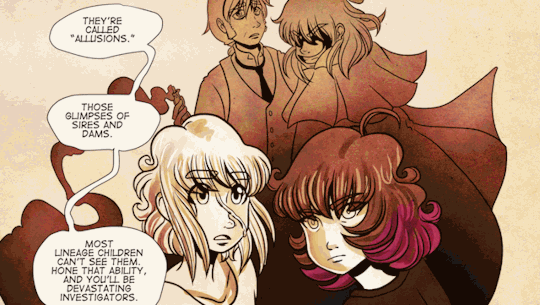
Sire
Anna & Susan - Odds Are - BNL
(Cannot for the life of me find the rest of those playlists. I’m sure there were a ton. Anyway I know a fuckton of weird old musicals, it’s mostly them.)

morphE - Mage: The Awakening Campaign
Campaign Theme: Dark Blue - Jack’s Mannequin
Ammi: Esperandote - Rika Muranaka & Vanesa Quiroz
Sanguine (The First One) - Mister Blue Sky in G Major
Amical: Golden and Green - The Builders and the Butchers, Hurricane - Panic!, Killer Queen - Queen
Billy Thatcher: Every fucking song from Chess, The Musical, by Tim Rice and the boys from Abba
Hendrik Rakove: Hurt So Good - John Mellencamp, Lovefool - Spencer Day’s Cover, Love Me Dead - Ludo, Grace Kelly - BYU A cappella cover, Talk about You - MIKA, It’s All Been Done - BNL, The Show Must Not Go On - Harvey Danger, Circus- Drew Gasparini and Lindsay Mandez.
Talaiporia- Choke - I DON'T KNOW HOW BUT THEY FOUND ME
Andrew Cross: Camisado- Panic!

Closing Shop - (The weird experimental meta campaign that literally ate itself)
Steam Rising - Murder By Death, Devil’s Calling - Florence and the Machine, Talkin at the Texaco - James McMurtry, Keepin’ It Real - Barenak BLOW BY KESHA BLOW BY KESHA GET MY SONG RIGHT GET IT RIGHT, Sometimes the Line Walks You - Murder By Death
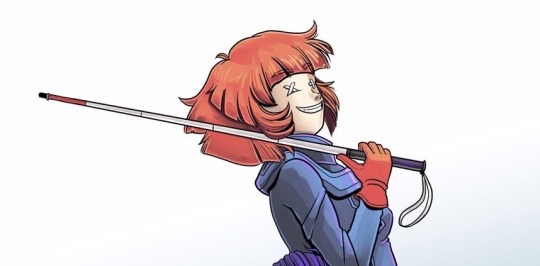
Exit Signs- Slashers/mixed nWoD Campaign
Season One theme: What if I’m Wrong - Damien Rice
Season Two Theme: I Wanna Get Better - Bleachers
Cyril: Disaster - Drew Weston, A Little Irony - Tom Milsom.
Dea ‘Exit’ DeLus: When I Grow Up - Tim Minchin, Break Your Heart - BNL, If I Had a Heart - Fever Ray, Crystalline - Bjork, Still - Ben Folds, Come Into My Head - Kimbra, Dinner at Eight - Rufus Wainwright, What You Know - Two Door Cinema Club, Big Dark Love - Murder By Death, Bitter and Sick - One Two,
DRT: Bitter Rivals - Sleigh Bells, Passcode - BNL.
Swing: Boogie Feet - Kesha.
Deirdre Whitman: Welcome to the Ball - Rufus Wainwright.
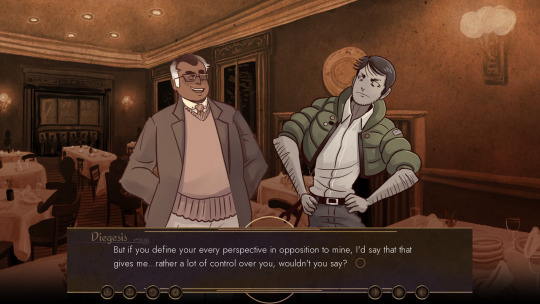
NonPlatonic Forms
I’m Gonna Win- Rob Cantor Boomerang - Lucy Schwartz, Hate that you know me so well- Bleachers, Jericho - Rufus Wainwright, Guster - Center of Attention, Toe to Toe - BNL, Give It Back to You - BNL, Limits -BNL (I apologize for nothing I love Silverball), Blood - ANIMA!, and of COURSE- Dead Inside by Patricia Taxxon!
- Other characters -

Channery Keene
Artificial Heart - JoCo, Erase Me - Ben Folds Five, Desperate Measures - Marianas Trench, Haunted - Maya Kern, Cake - Melanie Martinez, Bulletproof- La Roux, Cassandra - Area 11, Stolen - Greentree, Guster - Simple Machine, Make Me Feel - Janelle Monae, Could I Leave You - (specifically Donna Murphy at the Sondheim’s 80th concert).
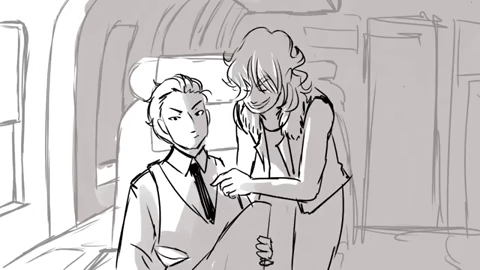
Chrome and Prism
Kiss with a Fist - Florence and the Machine, Langhorns - Spybeat, Dancing’s Not a Crime - Panic!, Thanks I Hate It - Simple Creatures, Sweet Talk - Saint Motel, This Is Love - Air Traffic Controller, Nothing Without You- Vienna Teng
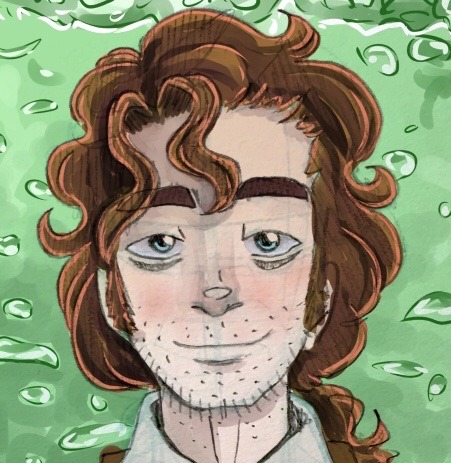
Harold Ludicael
Consequence Free - Great Big Sea, Sea of No Cares- Great Big Sea, Don’t Threaten me with a Good Time - Panic!, Dust and Ashes from Great Comet, I Need to Know from Jekyll and Hyde; Boy Decide - Murder by Death, Spring Break 1899 - Murder By Death, My Type - Saint Motel.
#ocs#character songs#I think I also have a playlist for Gray Jacket but I can’t find it#I apologize in advance for no Academic songs yet#haven’t been listening to enough new music lately#But I used to burn CDs for my tabletop groups#I made cover art and liner notes with art for the tracklists too#And I also spliced songs together on occasion#the Keepin’ It Real track in Closing Shop started glitching in the middle#before turning into Kesha’s Blow#It was a way to both characterize the villain AND have them pull off a 4th wall break#The fact that I don’t do webcomics or twice a week tabletop sessions anymore is#like I took the weights off#if anyone wonders how I make so much stuff#it’s because is was forced in a terrible crucible#XD
5 notes
·
View notes
Note
I know I've infodumped probably a ton about it already and stuff, but lol
"Strange Case of Dr. Jekyll & Mr. Hyde" (yes, that's the book's full real name) for the dashboard osmosis ask game-thing?
From what I've gathered it's about this middle aged man whom I assume has a doctorate due to being called Dr Jekyll, who invents himself a new cool edgier original character do NOT steal persona so he can do crimes and shit without the blame being on him. In many iterations of this story i've understood Hyde is more of a... thing that just randomly possesses Jekyll and Jekyll himself is an innocent victim wrapped up in all this but i think it's different in the original book.
Then there's also some other middle aged dude who's name i cannot for the life of me remember. Not sure why but i assume he's a bit gay in that classic lit gay -way but he's probably still like married to a woman? I don't know where i'm pulling this from
Also i assume the book is kind of a murder mystery thing?? Somebody has to die, i refuse to think at least one person is not murdered in this book
1 note
·
View note
Text
switchblade faith // spencer reid - chapter 3
summary: one month after joining the BAU, Clea is still settling in. between solving murders and getting acclimated to DC, the only comfortable thing in her life is her friendship with Dr. Spencer Reid.
word count: 4k
content warnings: mention of rape and victim-blaming (talking about Clea's previous job in sex crimes— not her personal experience).
masterlist
this chapter is drawn from the season 1 episode 17 episode "A Real Rain," which is supposed to be in New York, but I didn't wanna write about New York so I changed it to Boston.

I drop a second sugar packet into my coffee before taking a tentative sip. my face twists in discomfort. previous to working here, I would bring my own thermos from home and it would last me all day, but I've had to up my caffeine intake to two or three cups.
"you get used to it." JJ walks over to me, steeping her tea. despite the fact that it's early, she's perfectly put together. her hair is tied up and her eyes are sparkling.
"how?" I laugh. she points to the coffee pot, which is fresh and yet somehow tastes slightly stale.
"when you've been up for twenty four hours, you won't care how it tastes."
I avert my widened eyes at this.
"you could do what Spence does and just add a bunch of sugars." she tilts her head towards Reid, who is rocking back in forth in his spinny chair with a huge volume open in front of him. he doesn't even notice us staring at him.
"ew, what?" I giggle. JJ nods.
"hey, Spence!" she calls across the office. his head pops up to frown at us.
"yes?"
"how many sugars do you use?"
"five. occasionally six." he says this without a hint of the shame it deserves. my eyebrows shoot up and I take another sip of the bitter drink, trying to ignore the taste. it coats my tongue.
"see?" she smirks. "just so you know, we have another case. meeting in five." she sashays away to the conference room, leaving me standing there with an overwhelming urge to sweeten my drink. I keep it at three and add a splash of creamer to drown out the bitterness, then walk briskly to my desk to grab a few of my things.
"we have a meeting, Reid." I say across the divider between our spaces. he holds up an index finger, slams the book shut, and grabs his things. I wait for him to get collected before we head up.
"what were you reading?" I ask, peeking at his workspace. books are lined up against the divider, loose papers scatter the surface, and there are three uncapped pens littered about. his disorganization surprises me.
"War and Peace." he replies, checking his watch.
it's not even nine am.
...
I'm staring out the window of the jet while Morgan and Prentiss battle out yet another card game with Reid. there's not much to see until we slice through clouds and fly over Boston, which is glittering in the early light. I sigh and turn back to my book, tucking my legs up beneath me.
"this is not how I planned to visit." Morgan notes, looks through his cards.
"I'm looking forward to seeing Boston." Spencer smiles softly. at this, all of us look up.
"you've never been?" Morgan asks doubtfully. Emily snorts.
"we've never had an unsub there." Reid doesn't seem to think this strange at all. Morgan and I share a glance before he speaks.
"Reid, it's an hour-and-a-half flight."
"I'll show you around if we have some time." Emily smiles reassuringly at the boy genius.
"it's an easy trip, man." Derek chuckles. Spencer isn't bothered by our teasing. instead, he draws another card from the deck and focuses on his game.
"I've never been either." I state. the team turns to me with surprised expressions, causing my cheeks to flush.
"you, too?" Morgan makes a face like I've disappointed him.
"I've been meaning to go." I shrug. "there's an exhibition at the Museum of Fine Arts that I wanna see."
"what exhibition?" Spencer doesn't look up from his hand.
"uh, Titus Kaphar." I haven't had the opportunity to travel much, so a lot of the art I've seen has been from a computer screen or in class in college. it would be nice to actually get some experience seeing things face-to-face.
"Shifting the Gaze!" Spencer's face snaps up to beam at me, referencing the piece so vehemently that it makes me laugh.
"yeah, exactly."
"I went to his talk a couple years back."
"no way. really?" I shut my book and lean forward while he nods. Prentiss and Morgan are watching our conversation like a tennis match. while Reid rambles about all the things he heard at the lecture, I listen intently. it's good, because I don't really feel like talking right now; my head is pounding all over again, and this is distracting.
"do you ever go to the art museums in DC, then?" I ask once he's finished. Reid gets this crooked smile on his face like he wants to say a bunch of things, but is holding his tongue. his face is animated when he tells me about the other exhibits he's seen at the Smithsonian and apparently abandons his cards. Prentiss and Morgan have lost interest in our conversation; they start their own game and let us talk for the rest of the flight.
when we touch down, I immediately feel overwhelmed by the crush of people around us. our first crime scene is a taxi cab in Hyde Park, where the driver has been blindfolded, shot in the chest, and stabbed right through his ear. the blade, broken off from the handle, is lodged in his brain.
despite the fact that his kills are violent and seemingly random, the unsub definitely isn't disorganized. he carries his MO out the same way each time, which makes all of us question if we've missed a connection between victims.
"it's possible he's a sort of serial killer groupie." Spencer notes as he examines the inside of the cab, which is splattered with a mix of rainwater from the night before and blood. I shift where I'm standing to try to follow his line of sight.
"what do you mean?"
"Lawrence Bittaker and Roy Norris drove ice picks into their victims' heads and broke off the handle." he explains.
"well, if he's doing that, then he's presenting a mixed profile." I frown.
"exactly."
"mixed profile?" the police officer next to me asks.
"yeah. the fact that this guy is shooting his victims first suggests that he needs a quick and effective means of controlling the situation, which means that he probably doesn't think he can overpower them." I say.
"he could have a physical problem-- or maybe he's just not confident because he's small." Reid is still examining the taxi for any further evidence, but it seems sort of pointless.
"plus, he's organized and hunts at night. that tells us he most likely has a steady job."
"so," the cop stares between us with a perplexed expression. "we're looking for a small, angry white guy with a day job?"
the sarcasm in his voice makes me smile a little.
"I know it doesn't narrow down a lot right now, but we know that this guy isn't blitz attacking his victims. it's more of an execution."
the officer nods at this and my phone buzzes in my pocket. I turn to Reid.
"we gotta go."
Spencer nods curtly, straightens, and starts to immediately walk back to the car. I shake my head at his behavior, then follow after.
...
we get called to visit a new crime scene in the morning, this time in a church. Hotch holds the door open for me and I walk in to see a body laid out in front of the pews. an older woman sits towards the back, comforted by a nun.
"how'd they find him?" Prentiss asks the police chief as she leads us to the victim.
"night janitor." she nods to a man being questioned by cops in the corner.
"did he see anything?" I ask her.
"no, but he remembered a parishioner who was here earlier," we walk past the older woman. she stares at us expectantly as the chief talks. "so there could be a potential witness."
we stop at the body of a priest, his eyes covered and a blade lodged in his skull, unsurprisingly. Emily and I stare down at him, realizing the same thing.
"first public killing." she notes as she bends down to examine his wounds. "he's getting bolder."
"the presentation is just as important as the kill." I join her on the ground, snapping my gloves tighter on my hands and turning his head to the side to get a better look at the blade. semi-dried blood coats the tied fabric around his eyes.
"I'm gonna go talk to that woman." Emily leaves. the crime scene agent crouches down on the ground across from me, and I bite my lip before making a strange request.
"would you mind... sliding that thing out of his ear?"
the agent blinks at me in disbelief, probably not wanting to pry a knife out of someone's head, but nods and does so carefully. I squint down at the wound. then I realize something.
"Reid?" my voice carries across the room. Spencer is talking to an officer when he hears me and walks over.
"this doesn't look like a normal blade, but I don't know what it is." I point at the now half-buried weapon. it sits unpleasantly out, the blood catching warm light. Spencer gets down next to the crime scene agent and examines it more closely.
"this is flint." he says slowly, turning to me with a concerned expression.
"like the stone?"
"flint is the symbol for protection and retribution in Egyptian mythology. with hieroglyphics, they used to display dangerous animals like scorpions and snakes being cut with flint knives in order to render them powerless."
"oh." is all I can manage while I process what he's saying. Spencer waits for me to say something else, but instead I bend my head down to pull back the silk tie.
"there's no way that using flint is a coincidence." I reason. the blood is all on the inside of the tie as well, which gives me pause. Reid recognizes this a second later, his eyes lifting to mine. they look almost brown in the candlelight, flecks of gold sparkling in them while his mind whirs endlessly.
"I'm gonna call Garcia to see if any of the victims have been charged with a crime." he tells me.
"good idea." we both stand, the crime scene agent scurrying off to do something else. I head back over to Emily and hope that we're right about this. flint is too specific of a weapon for it not to be intentional, right?
...
we deliver the profile by the end of the work day, our unsub a serial vigilante with a personal edge to all of his killings. my body is slightly shaky from downing cups of coffee without any actual food, so the promise of eating out after we finish makes my stomach eager.
we go to a Chinese restaurant by the station and keep talking about the case, despite having promised ourselves not to do so. I sit between Prentiss and Reid while I dig into my dumplings. I like listening to them swap theories and past cases, how they weave together all their stories.
"you forgot to add something to the profile earlier today, Aaron." Rossi says as he piles more noodles onto his plate. our attention immediately focuses on the Italian.
"what did he forget?" Prentiss has a ghost of a smile on her face. I've noticed that she tends to speak like she's on the inside of a joke that other people don't understand. the intonation of her words feels like a secret.
"I didn't mention the possibility of our unsub being a cop." Hotch takes a sip of his ice water. there's a moment where we all reflect on this information before Morgan breaks the silence.
"I mean, they do know the system."
"they could easily take matters into their own hands, given what they see every day." Prentiss adds. I nod.
"when someone like our victim is killed, police refer to it as a public-service murder." Reid struggles to get the noodles onto his chopsticks, which I notice but don't say anything about. he tries again, the food slipping back onto his plate. Morgan notices this shortcoming of Spencer's and I see that he's about to start teasing him, so I change the subject.
"I saw a lot of rapists walk when I was in sex crimes," I put down my dumpling while I talk. Hotch watches me intently. I haven't spoken much about my previous job with anyone on the team, especially not him. in fact, he barely knows anything about me. "a lot of the victims didn't feel safe pressing charges, or the juries said they were asking for it. it's enough to make you wanna explode."
"it's a long way from feeling like that and actually committing a murder, though, don't you think?" Emily asks.
"not really." I turn my gaze back to my plate and start to feel nauseous. there's a clinking of plates and silverware as we continue in silence. Emily nudges my arm gently with hers and offers me a supportive smile.
I hear Spencer next to me, getting the attention of a passing waiter.
"excuse me," he says in a low tone. "can I get a fork, perhaps?"
Morgan snickers as the waiter takes off to get the utensil. at this point, there's a palpable tension as we wait to see who makes fun of Reid first. he drops his chopsticks into his bowl with a defeated clatter and Derek gently pushes his knuckles against Spencer's cheekbone.
"having some trouble, kid?" he asks. Spencer smacks his hand away.
"don't be mean." I giggle, reaching onto my wrist to grab a hair tie. "here, try this." I wrap the thing around the end of Spencer's chopsticks so that they're easier to use, handing them back to him.
Spencer tries again and it works-- if not somewhat clumsily. he gives me a little appreciative smile and I smile back before returning to my food, listening to the stories that Rossi doles out. he even pays for dinner despite our half-hearted protests.
the entertainment for the evening is pretty nice, but when I've stuffed myself with Chinese food, Emily leans over to me.
"do you wanna go to that museum you were talking about earlier?" she whispers. I peek at my phone to check the time.
"I doubt we'd have much time before they close, but yeah, definitely." excitement bubbles up in my stomach as I realize I might actually get to poke around for a while. Prentiss throws her napkin on the table abruptly.
"Clea and I are going to the Museum of Fine Arts. anyone wanna join?"
I look around to gauge some reactions.
"I'm interested." Morgan nods.
"I've already been several times." Rossi takes a sip of his drink as he politely declines. Hotch shakes his head.
"I have some paperwork I need to finish."
"again?" Prentiss complains.
"I'll go." Spencer sits up straighter as he looks at his brunette friend, folding his napkin neatly on his plate. my eyebrows raise a little, although I'm not surprised that he'd be interested in visiting any museum. we stand and get ready to go; Hotch warns us to be ready to go at seven in the morning tomorrow. a little weight is lifted off my chest as I realize that there will be some reprieve during this case, and then we're wandering out into the evening air.
we ate dinner sort of early, so the sky is still slightly aglow with a bruised shade, preparing to sink into its favorite darkness. after finding the route to the museum, we hop on the train.
Boston is lovely in the kind of way that aches of neat corners and airy lights. stores crammed with antiques and novelty products line the sidewalks, people wander about as they take in a pleasant night. somehow disjointed and cohesive all at once.
whatever bit of conversation we had on the way dissipates into breathlessness once we get inside the enormous entryway. it's cavernous, extravagant, gorgeous. we flip through brochures advertising different exhibits. Emily raves about Impressionism and decides that that must be our first stop, so we head off with the rest of the museum stragglers who have decided to feed themselves with art until they're forced to leave.
my head is constantly spinning to admire something else in the enormous white rooms. it's a bit overwhelming at some points, what with the gargantuan canvases that greet me at every turn. but it's impressive, too, and I find myself hungrily reading all the small plaques. I venture out of the Impressionism vein and into Korean art, my feet carrying me away from Morgan and Prentiss. Spencer broke off a while ago; to where, I have no idea.
I check out vases and pottery, sculptures, renderings of historical events. images from the crime scenes fill my head intrusively. there's no use in trying to shut them out; they've been in my dreams for a while now, the kind that wake me up in a cold sweat. I haven't told anyone about them— I'm sure others get them, too— and I don't want to seem like I can't handle it. every time I close my eyes, I begin to feel the pressure of a knife against my temple.
"a lot of these are from private collections."
the voice causes me to jump, my skin erupting in goosebumps as Spencer stands beside me. he holds his bag against his side and follows my line of sight to the 18th-century bookshelf screen.
"that's interesting." I reply. what else is there to say to that?
"really makes you think about what other art pieces won't ever be seen by the public." he turns and starts walking onto the next work, seemingly done with this conversation. my brow furrows while I watch him go, his posture miserable as a result of his skinny build. he's quite tall.
"what do you mean?" my voice comes out quiet, but it carries in the otherwise empty exhibit. Reid turns around and stops in his place, allows me to catch up briefly. we start to read another plaque by a silver basin.
"you could have a Cézanne just rotting in your attic and it would never be examined by the right scholars." he shrugs.
"I really doubt there's anything nearing that value in my attic." I laugh.
"you ever seen 'Antiques Roadshow'?" he asks non-sarcastically. I balk.
"sure."
"you never know." he's not a man of many words, apparently. I get his message regardless and we continue to walk, him setting out facts for me in neat rows, simple and easily taken in. he's definitely a know-it-all, but not in the way that makes me want to escape his presence. it's sort of comforting, having someone around who just understands everything. his absolute lack of social graces makes him easy to be around, too; I don't need to force conversation because he doesn't care.
we wind up in the mummy section, where the walls tingle with an energy that could only be described as magical.
"spooky." I nod to the domineering sarcophagus lid of Kheperra. a spotlight illuminates all of its intricacies and I make a beeline for it. Spencer trails behind me and we fall into silence as we peer at the exquisite details. it's intimidating, for sure, hulking and made of carved black stone. "you feel that?" I whisper to Spencer, who is enthralled in the image.
the way the spotlight spills over onto him is interesting; it emphasizes the shadow below his jaw and the delicate quality of his bone structure, his cheekbone prominent at the place where his ear meets his face. his lashes are long and lovely, his Adam's apple poking out of a slender throat. he turns to me with a curious expression.
"feel what?"
"the energy change," I smile. "from the ancient dead bodies."
"it's probably just the dark lighting and the media associations you have with mummies." but his eyes begin flitting about the room in a slightly panicked manner. I feel a smirk tug at my lips as I step closer to him.
"are you scared?"
"no," he scoffs and makes a face like I've made the world's most absurd accusation. "why would I be scared?"
"because we're all alone in here..." I use a lower tone to freak him out a little. "who's to stop them from coming out and... snatching us?" when my hand snakes around behind him to pinch his arm, he jumps.
"what the--" he catches sight of the devilish grin on my face. "don't do that!"
"sorry, Einstein." I laugh and turn in the other direction, him following me to the next piece. Spencer doesn't seem to have more thoughts to give on the exhibition, probably still a little creeped out. part of me begins to feel guilty for startling him, even though he constantly does that to me. his footfalls are weirdly soft.
I wonder what Spencer is like outside of work. what he does when he gets back to his apartment. how could someone like him entertain themselves? maybe he just reads books until his eyes glaze over. he definitely doesn't go out often, but maybe he has other nerdy friends. I hope he does. there's something in his eyes that's too viscous for me to grasp, something swimming and pocketed. I'd like to understand it, although that doesn't seem like a great idea to pursue. he barely gives his closest friends information about his life.
we end up at opposite ends of the room, him still examining an entombed husband and wife couple while I check out a canonic jar. the silence in this room is tangible. I wasn't lying when I felt an energy shift— it's like gold and clay and it smells like cracked cinnamon.
I'm trying to get a better look at the detailing when I feel a cold hand wrap around my forearm, easily encircling it. I jolt.
Spencer stands behind me with a playful smile, like he's quite pleased with himself.
"Reid!" I yank my arm away from his long fingers and see him let out that rare laugh. it's pleasant and fills the room with a warmer light as I rub my arm where his fingers held me. I'm surprised he was willing to touch me at all; it's pretty obvious that he's got a problem with germs, which is understandable.
"who's scared now?" he tries to defend himself with his palms when I reach out to gently smack his shoulder.
"you know, I was starting to feel bad for you." I laugh. he smiles brightly and keeps walking into the next room. I realize that the way we move is like two weighted ends of a string. he drifts out on his own, I follow, and vice versa.
I appreciate that he's beginning to loosen up around me, so much so that he smiles at a joke I make in the English Regency section. we walk quickly to absorb as much as we can before the museum closes, but we still don't get through all of it. Spencer isn't much of a conversationalist, and he doesn't really need to be. he listens to me talk, I listen to his erudite observations, smiling when he uses certain terms that sound like they're from someone much older.
by the time a curator tells us we have to go, we've completely lost Prentiss and Morgan and end up meeting back at the entrance. it's pitch black outside; Boston is still bustling, except my legs are tired and I'm ready to crash in bed. we have another packed day tomorrow.
#spencer reid#matthew gray gubler#dr. reid#criminal minds#mgg#fanfic#fanfiction#wattpad#friends to lovers#BAU#slow burn
50 notes
·
View notes
Photo
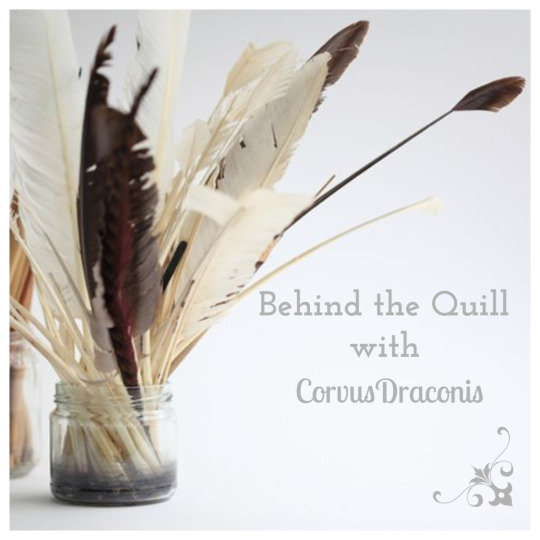
Interview given to The Severus Snape and Hermione Granger Shipping Fan Group.
https://www.facebook.com/groups/199718373383293/
Hello CorvusDraconis and welcome to Behind the Quill, thank-you so much for sitting down with us to chat.
You’re a well known and beloved figure in the SS/HG community for your many stories - including a personal favourite of mine, A chance for happiness.
Okay, let’s jump right in.
What's the story behind your pen name?
I have always had a fascination for the shiny things and the Northwest Coast depictions of Raven the Trickster/Creator, and, I tend to hoard (and get super protective) of my art supplies. Corvids have always been a positive sign in my life. They tend to show up when I’m feeling down and engage in funny antics in the yard. As for dragons, I’ve always had a love for them and think the Western depiction of them as dangerous beasts with no mind but for hoarding treasure and killing people only to be slain by a knight quite despicable.
Which Harry Potter character do you identify with the most?
Severus, actually. I see a lot of my life in his. Hardships, challenges, bullying— trying to be something better and later wondering about unwise decisions. I have a very similar dislike for dunderheads, but I do not share his inclination to denude rosebushes of their petals.
Do you have a favourite genre to read? (not in fic, just in general)
I have always preferred fantasy and sci-fi.
Do you have a favourite "classic" novel?
I am not sure if you would call it a classic novel, but grew up on all things Tolkien (and even puzzled through the Silmarillion at the grand age of seven), and have a special place in my heart for Watership Down. While I’ve read pieces like War and Peace, Iliad, Ulysses, Pride and Prejudice, Grapes of Wrath, Moby Dick, Great Gatsby, Little Women, Catcher in the Rye, Tom Sawyer/Huckleberry Finn, Scarlet Letter, Don Quixote, To Kill a Mockingbird, Animal Farm, Jane Eyre, Lord of the Flies, Tale of Two Cities, Heart of Darkness, Robinson Crusoe, Alice in Wonderland, Great Expectations, Odyssey, Frankenstein, Dracula, Crime and Punishment, Heart of Darkness, Dr Jekyll and Mr Hyde, The Secret Garden, Treasure Island, Anne of Green Gables, Les Misérables, Peter Pan, Gulliver’s Travels, all things Jack London, 20000 Leagues, etc.— they never captured me as aptly as Anne McCaffery’s Dragonriders of Pern or Mercedes Lackley’s the Last Herald Mage. Though, if I were to pick classic stories I read more than once (litmus test for things I like) it would be things such as The Secret Garden, Call of the Wild, Wild Fang, The Hobbit, The Lion, the Witch, and the Wardrobe, and The Last Unicorn.
At what age did you start writing?
The moment I could pick up pencil and paper, I was writing. I had notepads full of stories I wrote as a kid. Alas, my dad found them one day when I was off to college, made fun of them, and I came home and burned every single one in mortification.
How did you get into writing fanfiction?
The moment TV shows did “stupid things” to their characters. I used to write things about Beauty and the Beast (the old CBS show) when they killed off the main character, Knight Rider, Robocop, Transformers— there are probably far more that I just don’t remember now. I was writing it long before there was a fanfiction dot net or a term to even call it.
What's the best theme you've ever come across in a fic? Is it a theme represented in your own works?
I am a shameless romantic for the beauty within and sometimes the quite literal love for a monster (not just some person who acts like a monster and changes into a better person.) The misunderstood monster is perhaps my most favourite theme, and it shows up in my stories often if not always.
What fandoms are you involved in other than Harry Potter?
I ship SessKag from Inuyasha, Lucard/Sophie from Dracula: The Series, and Loki/Hermione when I’m feeling crossover-y.
If you could make one change to canon, what would it be? Do you have a favourite piece of fanon?
Other than my favourite fanon that Severus lives/survives/finds a better life free of two masters and his guilt, I would say I would want Harry to wise the heck up and realise his father was a swine, his godfather was an almost successful murderer that used his own best mate to try and kill off another student, and his mother wasn’t all that hot either. I would want him to find value in himself without having to make stuff up about his “perfect” parents. Then again, I would want Vernon/Petunia to be arrested for child abuse and put in gaol, but— then the story would have been very different XD
Do you listen to music when you write or do you prefer quiet?
Sometimes quiet, sometimes music. But usually, I am best mates with Spotify.
What are your favourite fanfictions of all time?
In the HP universe: I honestly don’t read many of them because I’m always writing my own stuff XD, but when I really feel like I need a good Ron bashing SSHG HEA, I read just about anything by IShouldBeWritingSomethingElse. However, that being said, I often return to “The Sun is Often Out” by Hannah-1888 for just the right amount of angst and HEA to make me happy.
In the Inuyasha universe: A Trick of Fate by PristinelyUngifted
In the Marvel universe: Mutual Respect Sends His Regrets by moor
In the Star Trek universe: Gratified By Your Company by starfleetdream
Are you a plotter or a pantser? How does that affect your writing process?
I go by the seat of my feathered rump, to be honest. Inspiration is a fickle, unpredictable beast, and I usually don’t know what is going to happen until it does.
What is your writing genre of choice?
Fantasy
Which of your stories are you most proud of? Why?
Chance of Happiness because it was my very first publication. It may not have been my best, but it was my first, and it very well could have been my last yet somehow wasn’t.
Looks Can Be Deceiving and One Step Forward, Two Decades Back are two epic tales that seemed to demand being written. The fact I finished them was something I think deserves a little pride.
Did it unfold as you imagined it or did you find the unexpected cropped up as you wrote? What did you learn from writing it?
Looks started off with me attempted to write Dramione just once. It failed. Draco demanded to be her brother of the heart, Viktor came in and said “nope she’s mine,” and no one was more surprised at the outcome of that story than me. The characters did what THEY wanted.
I learned that trying to plan a story from start to finish is useless when the characters decide what they want. The story demanded more, and I was just a conduit that typed it down. For me, at least, attempting to outline and plan is utterly useless
How personal is the story to you, and do you think that made it harder or easier to write?
I think every story I write is personal in some way. The inspiration comes from somewhere inside, and I often have no idea what it is until I go back and read it later. I think the story wrote itself in a lot of ways, which made it easier in a way, but there are a lot of things I can’t say were from personal experience because as a high fantasy of talking gryphons and such I can only imagine it. There is no basis in real life on how any of that would go down. There is a freedom in that but also many challenges in making it real enough to identify with despite how alien and fantastic the idea is.
What books or authors have influenced you? How do you think that shows in your writing?
Dragonriders of Pern introduced sentient dragons and the idea that despite a vast difference in species there could be teamwork and love between the two as they teamed up against a greater threat.
The herald-mage books by Mercedes Lackley were also important staples in my childhood because it impressed the values of responsibility despite having powers others did not, and that people were fallible despite greatness and potential.
Gandalara Cycle by Randall Garrett and Vicki Ann Heydron: I cannot tell you how often I read this story. I had dog ears on these novels because there was so much I loved about them. It was a search for humanity when displaced in a seemingly alien world, societal clashes, and the great sha’um (the giant rideable cats) that were the main characters’ partners for life.
The Enchanted Forest Chronicles by Patricia C Wrede: A princess rebels against her arranged marriage by running away to be a dragon princess.
All of these books had creatures in it that chose to partner with a human and be with them for life, not as lovers that you find in the more modern supernatural romance blender out there, but the ultimate friend for life— the family you choose.
Do people in your everyday life know you write fanfiction?
Oh heck no. Hah. They have their secrets, and I have mine. Personally, I think mine are more healthy than theirs.
How true for you is the notion of "writing for yourself"?
Very.
I write for myself. Sometimes I’ll write a story for one of my betas or a sshg friend, but for the most part, I write for my own entertainment because nothing like what I write is out there. There is a lot of SSHG out there, but mine is almost always a creature feature story. I blame X-Files growing up. It tickles me that others enjoy my stories, but in the end I write to get things down and out of my head. They just so happen to entertain others as they do me.
How important is it for you to interact with your audience? How do you engage with them? Just at the point of publishing? Through social media?
I will often engage in A/N talk at the end of chapters, but I really don’t engage in the fandom. I loathe social media. That being said, I read every review, and while I don’t reply to everything because FF dot net is a horrible platform for messaging anymore (or ever was really)-- I appreciate every single one. Sometimes it helps to know people are enjoying the story for the story’s sake.
What is the best advice you've received about writing?
Get a beta, even if you are pretty good at writing. Get one because a second pair of eyes will catch things you don’t. Read your own stuff out loud. If you trip over it, your audience will too. If you stumble, so will they.
Get a beta who isn’t afraid to tell you that your shite stinks in places and you make no sense. You may want a cheerleader, but what you need is a beta. If you are super lucky, you can have both at once.
What do you do when you hit writer's block?
I play computer games and sew things. I’ve sewn a lot of things lately. Scrub caps and masks for work—
There has been a lot of writer’s block lately due to the times, and I will not write when I’m uninspired. I will not force inspiration. That’s not fair to me or those unfortunate enough to share in the reading. I want to be able to go back on a story I wrote and enjoy it and not curse at myself. XD
Has anything in real life trickled down into your writing?
Sometimes certain catch phrases and things from real life friends have trickled in as a sort of Easter egg (unbeknownst to them since I don’t tell them I write fanfic). Sometimes random news stories or whatnot find their way in. Lessons of the day. Random events. Things that are too odd not to stick in my brain somehow. I can’t say I always do it on purpose, though.
Do you have any stories in the works? Can you give us a teaser?
No, I have a goal this year to finish off the unfinished stories. This is made harder because Dragon and the Rose keeps adding more and more bunnies into the idea bin, and my brain wants to run with them, but I’m like NO DANGIT, I HAVE STUFF TO FINISH STILL! It’s a hard thing trying to finish what you start when so much interesting stuff pops up and waves at you like “heeeeeyyyyy I’m cool too!”
Any words of encouragement to other writers?
Keep writing but remember you can always be better. You can always improve. Writing isn’t a popularity contest. It isn’t about how many reviews you get or how many fans you may or may not have. Write because you want to write. Write what you like not what other people like. Write for you because in the end, you are the one who goes back to read it and say “I wrote this story, and I still love it” instead of forcing yourself to write something just because the topic is “popular” and gets a lot of visitors. Write something you’ll be proud to go back and read and enjoy. You’ll find when you write something genuinely, readers will come. And if only one person leaves you a paragraph review on how much your story meant to them out of someone else’s hundreds of “great!” (with nothing else)-- think of what you value more.
If my story helped someone through a dark time.
Just one person—
Then it was a good effort.
Maybe that person didn’t have the bravery to leave a message. Maybe they are ashamed. Maybe they send you a PM instead of a review.
That is, to me, the ultimate reason why I realised that despite writing stories for myself that there are people out there that needed to hear my story at just the right time in their life. If my story can bring a little joy to someone else, then it doesn’t matter how many reviews I have. It doesn’t matter that I don’t have thousands of reviews like “that other author.” What matters is that I told my story; someone out there read it and it spoke to them.
I love hearing from people and what they liked about my stories, but I also am glad that there are some people out there who secretly like my stories but do not feel safe enough to review.
So, I would say to the aspiring author: write for yourself but share it. You never know whose day you will make with your story. They may never tell you. They may tell you years later (happened to me!). There is a good chance that someone out there needs your story as much as you need to write it. That being said, find yourself a beta to share your journey with you. You may find a few friend in the process.
Thanks so much for giving us your time.
You are quite welcome.
11 notes
·
View notes
Text
Castle of Devils
What's In The Creepy House? It's a Ghost! Its a Mummy! No! It's a Trash Man!
Prologue | Previous | Next | More | Masterlist
Word Count: 2,167
Pairings: Eventual Prinxiety
Warnings: self hatred, talking of murdering a vampire, ghost, not eating, let me know if I missed any.
Thank you to @icequeenoriginal for reading through this for me!
--------
Today was the first time since Roman had gotten back that Logan, Patton, and Roman all had a free day. So, the three were going to spend a day out on the town, hitting the mall, spending time in the park, shopping, and eating their meals together. They had even promised to go with Roman to see Frozen II in the theater one last time. The day was supposed to be perfect.
The three friends were walking along the street to get to their favorite pizza shop for lunch when it happened. A dark figure clad in purple plaid patches and white stitching walked past them on the opposite side of the road. It was pure coincidence that Roman looked up just in time to catch a glimpse of the figure's face before he moved out of sight. Roman stopped dead in his tracks, Patton and Logan nearly bumping into him.
"Roman!" Logan shouted.
"What's wrong?" Patton asked carefully, the fear on Roman's face an unusual expression for his friend.
"It-its him!" Roman yelped. "I- he followed me here!"
Logan frowned and turned Roman to face him only for his friend to continue staring off into space as if looking at the last spot he saw whoever it was who frightened him so much. "Who did you see?"
"Virgil! It's him! The vampire! He's here," Roman cried out terrified.
Logan thanked the universe there weren't many people near them.
"Roman, breathe. You need to breathe. What do you mean he's here?"
"I-I-" Roman paused, finally blinking as he tried to ground himself and bring himself back to the present. "I just saw him. He must have decided to move into the house I helped him purchase." Tears filled Roman's eyes. "We have to stop him. We can't let him kill anyone."
Patton stepped forward. "Roman," he started carefully. He didn't want to tell his friend he thought he was crazy. Because he didn't, not really. Patton just didn't want to be rash. "I think we should give it a few days…"
"A FEW DAYS??!?!?!" Roman exclaimed. "HE COULD SUCK THE TOWN DRY!"
Logan pinched the bridge of his nose. "Roman, we can't go to the police without solid evidence. If we go up to the cops right now with nothing other than your statement and the fact that you think he's a vampire, they could carry you away in a straight jacket. If we really want to get 'rid' of him legally, we have to wait until we have a least an attack, it's not the best but without one, that's all we can do."
Roman frowned. "What if we found a vampire hunter instead?"
Logan sighed. "Sure, if we found a vampire hunter and got their 100% guarantee that this 'Virgil' is a vampire then we can see where we will go from there."
Patton frowned. He knew his husband didn't believe Roman. He probably knew that Roman wouldn't be able to find a real vampire hunter willing to help them if he could find a real vampire hunter at all. And he hated the false hope it gave Roman, but if doing this could provide closure, then he was all for it so long as nobody got hurt.
Roman bit his lip. "Okay, I'll start looking tonight." Then the three were back on their way to lunch. Now, Roman was not stupid. He knew his friends thought he was crazy. But he was going to prove it to them once and for all. And on another note, maybe it was time to pay a certain someone a visit.
------
Remus Mort was an odd little fellow. He had unruly hair that never looked like it was brushed. Not that Remus actually brushed his hair. There was also a streak of white in his bangs while the rest of his hair remained a dark rich brown similar to that of a freshly disturbed grave. His mustache was particularly villianly with their handlebar shape and only added to his gremlin appearance. His clothes hardly took away from this either. They were ripped and rumpled, looking as if he had just crawled out of a dumpster. Maybe searching for new clothes, they would certainly be better than the ones he was wearing which were covered in so much grime that one could hardly call it a shirt. Rags would be more accurate. But if anyone were to ask he would reply with a grin saying no one would suspect a doctor dressed the way he was. The occupation differed each time but the result was the same. People just assumed he was happily living the life he was living even if it looked like he didn't own a home much less the amount of money he truly had.
Remus Mort lived in a big creepy mansion up on a hill surrounded by many trees. He bought the house after his first best seller, If Dr. Hyde and Mr. Jekyll: The Twisted Truth. It turned out, a lot of people were curious what would have happened if society was okay with man's more primal instinct (as if a lot of society didn't already try to place the crimes of men on others.) Remus went on to continue his dark series of stories earning him enough money to live comfortably and still give close to 40% of his earnings to different causes. Lots of them having to do with the ocean and a push to find the delightfully mysterious creatures yet to be found.
All of this displayed Remus's personality very efficiently. A gremlin dressed as a gremlin. It was very fitting. Remus was also very unpredictable. But those who knew him, even those who didn't would brush whatever he did off as normal for him after the initial shock. He was predictably unpredictable. However, the one thing that was truly unpredictable for Remus was something even he had no control over. His brother was practically his complete opposite.
Those who knew both Roman and Remus were equally stunned when they first learned that the two were brothers. They were two opposites and as different as day and night, water and fire. Polar opposites. A person learning the two were brothers would have them sitting in an existential crisis for a few hours.
The two brothers did not talk often, preferring to keep to their own lives with an occasional call to make sure the other was okay. Roman wanted nothing to do with his brother's habits. It was one of the reasons the two drifted apart. Past Roman never would have expected to end up here any time soon. But past Roman didn't know the things present Roman did. Did experience the things present Roman had experienced.
Roman sighed and turned off his car before climbing out. He had been sitting inside for a while, staring up at the old house as he debated his decision before he decided it was now and never. And he couldn't bear to think what his stubbornness would do to the innocent people back home with that monster running around. With determined steps, Roman walked up the stairs and rang the bell. It's loud dreadful sound resounded throughout the home. Roman was surprised to find the tall door opening in front of him and he stood face to face with his brother for the first time in years.
"Roman!" Remus exclaimed. "So glad to see you here! It's been a while hasn't it!" Roman blinked as his brother quickly yanked him inside and started dragging him into the living room, which looked surprisingly clean and organized. Remus shoved Roman down onto the couch before he dropped down beside him. "So, what has you dropping by, bitch?"
Roman grimaced. "Well, I.." He paused. Did he really want to admit to his brother that he drove all the way to New Jersey just to ask him for help regarding the same topic he told him he was stupid for believing years ago. Roman bit his lip and wrung his hands, his confidence fading. 'I-I.."
Remus frowned as he took in his brother's reaction. "Hey, you know I'm not going to make fun of you, right? Tell me what's wrong."
Roman let out a breath and then told his brother everything. From arriving in Transylvania to falling in love to finding out that he was a vampire and returning home only to find that vampire had followed. Throughout the story, Remus stayed silent. Which was a completely new thing for him. But while he didn't exactly get along with his brother, he did care for him deeply and seeing how his brother nearly broke out into tears as he recounted everything. Afterwards, Remus and Roman sat in silence for a few minutes to let the air clear and to let Roman compose himself.
Now, Remus would say his brother was very predictable. He always loved the idea of romance and love and would often wax poetry to whoever was his crush. (Not that it always worked out in his favor.) But Remus could tell what his brother was here for. He wanted him to be his wingman! To help him woo Virgil properly. He wanted Remus to tell him how vampires behaved and the things they couldn't have so Roman could plan a surprise picnic. And they were twins, when they were in the same room, they almost always seemed to know what the other was thinking. So, Remus would say he knew his brother pretty well.
"I want you to help me kill him." Wait, what?
Remus blinked. "What?"
Roman gulped. He really didn't want to have to repeat it. Just trying to say it the first time was like pulling a tooth. He didn't want to kill Vir- the vampire. But, he had given his word that he would rid the people of the monster. And that's what he had to do. "I need you," Roman pushed out. "To help me...I- I need to get rid of the monster. I made a promise to do so."
Remus blinked. "You want me to help you kill a vampire?" Roman nodded. Remus bit his lip. He could work with this. Sure his gay disaster if a brother wouldn't be much help but he could work with this.
"Yeah, don't worry, I'll help," Remus replied, his mind already whirling with different plans. His face twisted with gremlin-like glee.
Roman sighed. "Thank you, Remus. Thank you."
-----
Virgil laid faced down on his new bed and groaned. "Uggggggghhhh. That was so much work."
Valak chuckled as he floated above Virgil. "Perks of being a ghost, got an excuse not to do chores." Virgil rolled his eyes and turned his head to stick his tongue out at the ghost. They existed in silence for a few moments before Virgil sat up against the headboard and pulled his knees to his chest. Valak paused in his floating to look at him.
"What if...what if he hates me?" Virgil asked, his voice sounded small.
Valak hummed and gently floated down to land beside Virgil. "I don't think he does." Virgil hummed in acknowledgment. Valak frowned and tried again. "I think, if he truly hated you, he would have killed you as soon as you told him."
"He couldn't have, there was nothing he could use to kill me," Virgil mumbled.
Valak sighed. "Well, we'll have to see about that." Silence settled over the room until Virgil's stomach grumbled. Vievil frowned and shoved his face into his knees. The ghost frowned. "Virgil." The vampire ignored him. Valak rolled his eyes. "Come on, Virgil. You can't do this."
Virgil's face twisted in anger. "You can't stop me."
Valka let out a sigh. "Virgil, you have to eat."
Virgil shook his head angrily. "No."
Valak and let out a sigh. This wasn't the first time Virgil refused to eat. Virgil didn't know it, but Valak had witnessed every time Virgil had stopped eating. Luckily, Virgil always pushed through it. The only problem was he didn't know when Virgil would eat again. And they were in a new country. They didn't know where dangers lied. For all they knew, a vampire hunter could be living just down the block. Valak highly doubted it but he knew you could never be too careful.
"Virgil," Valak started.
"No!" Virgil shouted. "No! I'm-I'm a monster! All I do is suck the life out of people! I'm a monster! I'm a monster! I'm a monster!"
Valak sighed. "Fine, okay." Virgil huffed and went back to stewing in his self hatred while Valak floated out of the room to explore the house for a little bit. He really hoped Roman loved Virgil. He didn't want to think of how much damage it would cause Virgil's mental health if he had someone he grew close with running after him with a steak trying to kill him. If only there was someone who would help me convince Virgil that he isn't bad.
--------
Everything taglist: @spxced-oxt @superwholocked-for-life @mirror2thespirit @aroundofapplesauce @lyditist @little-euro-girl @unicornofdarknessstuff @maryann-draws @odette-ssbu
Castle of Devils taglist: @kittycake574 @rainbow-roman @icequeenoriginal @ilovemygaydad @comicsimpson @notalwaysthebadguy @loveyatothemoonandback
#castle of devils#remus sanders#thomas sanders#virgil sanders#roman sanders#sanders sides#sanders sides fic#sanders sides au#sanders sides roman#sanders sides virgil#sanders sides logan#logan sanders#ts logan#sanders sides patton#ts patton#patton sanders#virgil sanders angst#ts virgil#ts remus#ts roman#ts deceit#sanders sides deciet#ghost deciet#deciet sanders#sympathetic deciet#vampire virgil#mycatshuman fics#mycatshuman writing#ts eventual prinxiety#ts logicality
48 notes
·
View notes
Text
“What Went Wrong With ‘CHARMED’?”
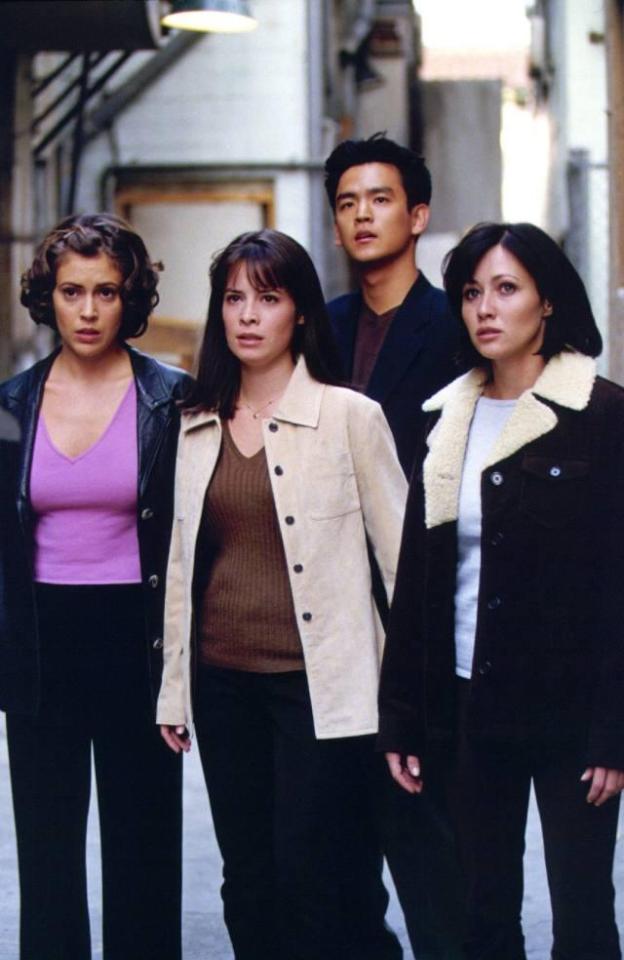
"WHAT WENT WRONG WITH 'CHARMED'?"
What happened with the original "CHARMED" (1998-2006) series? How did a show that for a brief period, used to be one of my top ten favorites ended up as something for me to be derisive about?
Well, below are what I believe are the three major traits that contributed to the show’s decline (at least for me) - morality, portrayal of men and magical powers.
Morality:
For me, this was a major problem with the series. The audience was led to believe that the Halliwell sisters aka the Charmed Ones were the epitome of goodness, yet the writers have allowed them to get away with some very despicable acts. I am not one of those who demand that protagonists of a fictional story - whether in print, movies, plays or television - be flawless or ideal. I realize this is impossible, due to human nature. But I believe that when a work of fiction allows its protagonist to make a mistake or crime, I believe the writers should allow that character to face the consequences of his or her actions. Unfortunately, this rarely happened on "CHARMED" - especially in regard to the Charmed Ones and their whitelighter, Leo Wyatt. On the other hand, the Charmed Ones, Leo and the series' show runners and writers made certain that others - like Cole Turner - pay the price for their actions. Whether they deserved it or not.
Piper Halliwell's Purchase of Illegal Fruit - In the Season Two episode, (2.12) "Awakened", a greedy Piper had purchased illegal fruit from South America that had not been inspected by U.S. Customs for a cheap price. She had plans to serve the fruit to her customers at her P3 bar. After sampling the fruit, Piper became afflicted with a deadly disease called "Oroyo Fever". First, her sisters Prue and Phoebe used a spell to save her life by directing the disease from her body to an ninja action figure toy owned by another patient. This act led to other patients in the hospital being afflicted by the disease. Eventually, Prue and Phoebe reversed the spell and Piper became afflicted again. In the end, Leo used his whitelighter ability to cure Piper.
Since Leo had used magic for personal gain, he lost his whitelighter wings . . . temporarily. The Charmed Ones, on the other hand, did not pay any price whatsoever for their actions in this episode. Piper managed to survive and did not face any illegal prosecution for breaking Federal law. Also, Prue and Phoebe did not pay any price for using magic for personal gain and threatening the lives of innocents in the process. On the other hand, Piper's miraculous recovery attracted the attention of physician, Dr. Curtis Williamson. His determination to learn how she had recovered so quickly led to him temporarily possessing the Charmed Ones powers and his death in a later episode, (2.20) "Astral Monkey". While Piper had lamented over not answering one of his earlier requests for a medical examination, neither she or her sisters felt any guilt over how their actions in "Awakened" led to Dr. Williamson's death in "Astral Monkey".
The 48-Hour Window of Opportunity Rule - According to the Season Four premiere, (4.01-4.02) "Charmed Again", the Whitelighters ("good") and the demons ("evil") had made a compromise regarding the moral compass of witches. This compromise created a period of forty-eight hours for a witch to decide his or her alliance or moral path. Frankly, I thought this was a dumb idea ever created by Brad Kern or one of his writers. The idea that the Elders' Council and the Source's Council had the authority to give a new witch a specific time period of free will to choose between good and evil is ludicrous. That witch or any other individual should constantly have some semblance of free will to choose any particular path . . . should have been regarded as a natural right. What made this rule even more ludicrous is once a witch makes up his or her mind, he/she will remain either good or evil until death. What on earth? This whole "Window of Opportunity" rule smacks of a fairy tale for children and not for a series about adult women. What Kern had failed to remember that life is uncertain, which means there are no real absolutes upon which one can depend. In other words, if Paige had chosen evil, her decision could never be regarded as absolute. In the real world . . . or in a well-written story, there would be no real absolute. Not only was this rule a prime example of how the series' black-and-white morality stagnated the series' writing development, it also appeared in the "CHARMED" reboot series. Pity.
Darryl Morris' Soul - In Season Six's (6.01-6.02) "Valhalley of the Dolls", two of the Charmed Ones, Phoebe and half-sister Paige Matthews had committed a despicable act with the psychic rape of their close friend, Inspector Detective Darryl Morris. The pair used a spell to strip Darryl of his soul without his consent. They had committed this despicable act in order to free Leo from Valhalla (Norse/Viking version of heaven) and have him remove a spell he had cast on Piper. Phoebe and Paige’s act should have had major consequences for them. Instead, the writers treated this act of psychic rape as a joke and dismissed the whole matter with Darryl lamely and quickly forgiving them. I was disgusted by this episode.
Rick Gittridge's Murder - Phoebe and Paige had committed another despicable act in the Season Six episode, (6.17) "Hyde School Reunion". Nervous over facing former classmates at a high school reunion, Phoebe had cast a spell on herself, regressing her personality to her seventeen year-old self. While under this spell, she used magic to help a former high school classmate named Rick Gittridge escape from prison. Eventually, Phoebe recovered from her spell and realized she had a convict who knew she was a witch on her hands.
When Rick held her and Paige at gunpoint and demanded that they change his face so that he could avoid the police, Paige obliged, at Phoebe's urging, by giving him the face of their nephew and Piper and Leo's younger son, Chris Halliwell. What Rick did not know and the sisters did was Chris was on the run from a group of Scabber demons that he had angered. So . . . instead of teleporting the gun from Rick's hand and sending him back to prison with his memories wiped, Paige transformed his face to resemble Chris'. The Scabber demons saw Rick with Chris' face and promptly killed him before disappearing. And both Phoebe and Paige - to my utter disgust - declared their action had been necessary. In other words, Phoebe and Paige got away with cold-blooded murder thanks to Brad Kern's misplaced sense of justice.
Alliance with the Avatars - Another major crime that the Halliwells had committed was helping the Avatars (an ancient group of extremely powerful magical beings) change the world by removing any dark thoughts from the human race and committing genocide against demons … all so that they can selfishly lead happy lives and not hunt demons. This little act, which had occurred in (7.12) "Extreme Makeover: World Edition", resulted in the psychic rape of the world’s population and the deaths of those few who were not affected by the spell. And what happened after the following episode, (7.13) "Charmeggedon"? Leo paid the price for his part in the spell with the loss of his whitelighter wings and position as an Elder. Yet the sisters - especially Piper - avoided any consequences for their actions. Again.
Instead, they blamed the Avatars for not telling them everything and the Elders for driving Leo into becoming an Avatar. This was so cowardly on so many levels. At this point, my opinion of the Charmed Ones had sunk to a new low. Their unwillingness to learn any lesson from their own mistake and blame others disgusted me to my core.
Cole Turner aka Belthazor's First Death and the Source - Sometime in early Season Four, Phoebe's lover and former assassin - the demon/hybrid Cole Turner aka Belthazor - lost his magical powers due to an old potion made by the Charmed Ones back in Season Three, because a woman wanted revenge for his past killing of her fiance. When the sisters were threatened with death at the hands of the demonic leader known as the Source, Cole used a magical object to strip the villain of his magical powers and use them to save Phoebe and her sisters. Unfortunately for Cole, he ended up being possessed against his will by the Source's spirit. Episodes like (4.14) "The Three Faces of Phoebe" and (4.16) "The Fifth Halliwell" had made it very clear that the Source had taken possession of Cole's body. Instead of having the Charmed Ones discover this, Brad Kern and his writers had allowed them to succumb to their worst fears and prejudices regarding Cole's past and kill him. To make matters worst, the sisters never found out in the following season that he had been an innocent victim of the Source. Instead, Kern and the writers dump some "Cole turns insane" story line in early Season Five on viewers in order to set in motion the character's departure from the series in the shitty episode (5.12) "Centennial Charmed". In doing this, show runner Brad Kern and staff writers had failed to allow the sisters a chance to discover their own potential for bigotry and evil and thus, kill any chance of them developing as characters. Only Prue had been given this chance in Season Three episodes like (3.15) "Just Harried" and (3.16) "Death Takes a Halliwell".
Other Magical Beings - The series' "black-vs-white" morality had became a prime example of how people judge others on a purely superficial basis. Which the Halliwells had been guilty of. Look at Cole for example. The only reason Phoebe and her sisters had originally believed he possessed the potential for good was due to his human ancestry on his father's side. For Phoebe and her sisters, Cole’s human half equated to good, and his demon half equated to evil. When Cole had lost his powers for the second time in Season Five (5.07) "Sympathy For the Demon", the sisters' whitelighter Leo Wyatt automatically judged him good, because he no longer had his "demonic" powers.
This all stemmed from the the series' never ending habit of labeling certain powers as good ("witches, fairies, whitelighters, etc.") or evil ("demons, darklighters, warlocks"), based on what kind of beings possessed them. I never understood why the series had continued to portray magical abilities in this infantile manner - especially for a show that was about adult women. "CHARMED" also made a big deal about witches not using their powers for personal gain. Yet, from what I have read about the Wiccan Rede (please correct me if I am wrong), personal gain is not even considered forbidden. Wiccans seemed to be more concerned with intent - using one’s powers to deliberately hurt another, forcing someone to do something against his or her will, or using magic on others without their consent, which the Halliwells were extremely guilty of in "Vahalley of the Dolls", (6.17) "Hyde School Reunion" and "Extreme Makeover: World Edition". And by the way, the Charmed Ones never paid any consequences for their transgressions.
Phoebe, her sisters and Leo seemed incapable of accepting the possibility that ALL BEINGS, no matter who or what they are - have the potential for both good and evil within them. The show has refused to accept the possibility that demons have the potential for good and humans have the potential for great evil (with the exception of a few). To the series' writers (and characters), a sentient being's morality is mainly based upon WHAT he or she is, and not on the individual's emotional state . . . OR CHOICES.
The reason I brought these issues is that Kern and the series' writers had allowed the sisters to get away with major crimes. The sisters had paid the price for using their powers for minor acts - like Prue using her telekinesis to force an annoying neighbor, who had been allowing his dog to poop against their front steps, to step in said dog poop; and Phoebe using her premonition power to find the future father of her future child - but never for major acts that I had listed above. Also, I really wish that "CHARMED" had been more ambiguous and complex in its portrayal of morality. Everything was so simple-minded and childish. Demons/warlocks are all evil; humans are all good (unless there are no demons around). What exactly was wrong in portraying demons and other supernatural beings as morally ambiguous? What was wrong in the sisters learning that morality was not as simple and easy to label, as they have assumed for so many years?
Portrayal of Men:
Another problem I had with "CHARMED" was its portrayal of many male characters. I understand that the series had wanted to portray women in a positive light - strong and intelligent. There was nothing wrong with that. By why did the series' portrayal of men had to be basically negative? "CHARMED" was supposed to be about feminism. However, my idea of feminism was not male bashing or emasculation. Unfortunately, the series was guilty of both. During most of Seasons One and Two, the sisters had a tendency to make many unnecessary quips at the expense of the male gender. And there was the (2.05) "She’s a Man, Baby! She’s a Man!" episode that I would dearly love to forget. And what happened to male witches? I can only recall seeing one so-called male witch on the show - Max Franklin from (1.14) "Secrets and Guys" - and at age thirteen, he was too young to be practicing witchcraft.
Regular Male Characters - Another problem is that most of the strong male characters on the show are either stripped of their power or dies. this happened to characters like Cole Turner, Andy Trudeau, Leo Wyatt, Chris Halliwell and Kyle Brody. The powerful half-demon Belthazor aka Cole ended up having his powers stripped in (4.08) "Black As Cole" and was "deemed safe" to marry Phoebe. And when he became more powerful than ever in Season Five, he was judged "evil and insane" and targeted for death by Kern and his writers in "Centennial Charmed". Andy Trudeau, a strong-willed San Francisco cop who also happened to be Prue's true love, ended up dead not long after he discovered that the sisters were witches at the end of Season One. Although Piper and Leo's older son Wyatt became a very powerful witch, he was too young for the writers to do anything about it. Leo became a whitelighter Elder at the end of Season Five and later, an Avatar in early Season Seven. Thus the writers felt that they had to break him away from Piper. And they did not reunite the couple until Leo permanently became a mortal (aka "safe"). Both Chris (Piper and Leo’s younger son) and FBI Special Agent Kyle Brody (Paige's love interest in Season Seven) were strong personalities who ended up dead - along with ex-demon named Drake who had decided to become a human. And how did the series end? With a powerless Leo, a non-magical husband for Paige, and a "Cupid" (magical being associated with love) for Phoebe to marry.
Darryl Morris - One would notice that I did not mention Darryl Morris, the detective inspector from the San Francisco Police Department, who had known the Halliwells since the beginning. Darryl had began the series as Andy Trudeau's partner. Following Andy’s death, Darryl became the sisters’ main non-magical contact between Seasons Two and Seven. The writers' treatment of Darryl really annoyed me over the years. After Season Two, I got tired of him freaking out whenever faced with the sisters' magic. Also, the sisters had badly mistreated him during Season Six . His soul was stripped from his body against his will in "Valhalley of the Dolls" by Phoebe and Paige. And he was was framed for murder by magical beings known as the Cleaners, who used him to cover up the Halliwells' careless use of magic. When he had decided that he wanted nothing to do with the Charmed Ones (and I did not blame him) in late Season Six, the writers had treated as the bad guy for failing to forgive them for what happened to him. And when Darryl finally reconciled with them in Season Seven, he returned to being one of the sisters’ lap dogs. Leo became the other one.After years of watching the show, I found myself wondering if both Constance Burge and Brad Kern had become leery of the idea of the Halliwells being associated on a permanent basis with strong male characters. And I found that sad.
Magical Powers:
How can I put this? One of the more confusing aspects of "CHARMED" has always been its portrayal of magic. The series' portrayal of magical beings and various abilities have struck me as contradicting. Another problem with the series was that the show runners and the writers had allowed its black-and-white mentally to label what kind of abilities that its characters can practice.
Fire Ability - For example, according to the series, any ability to do with fire can only be possessed by evil magic practitioners like demons and warlocks. Why? Fire is an element, not something evil. The series had featured a witch in its premiere episode, (1.01) "Something Wicca Comes This Way" as a pyrokinetic. Later, a young foster child named Tyler Michaels in Season Four's (4.12) "Lost and Bound" also had the ability to create fire. These were two rare cases in which "CHARMED" featured pyrokinetics who were not evil. However, the series eventually ret-conned Tyler as a Archai, an elemental being who could not only create fire, but use fire to create portals. Was Brad Kern uneasy over the idea of a minor protagonist being a mere fire starter? It certainly felt like it. Was the series’ portrayal of fire as something evil stemmed from religion? Again . . . it felt like it, but I cannot say for certain.
The Nexus - Another aspect of magic that I found ridiculous on "CHARMED" was the whole "Nexus Theory" from the episode (1.15) "Is There a Woogy in the House?". An earthquake had revealed a magical entity called "the Woogeyman" that resided in the Charmed Ones’ basement. The sisters had learned that their home was located on top of a spiritual nexus - a location that was equidistant from the five spiritual elements. And because Phoebe had been born inside their home, her moral compass could easily swing from good to evil, in compare to her sisters. This was all bullshit, of course, since anyone can swing from good to evil or back, considering the circumstances. But what made this "Nexus Theory" even more laughable was that the five elements that played a role in it - earth, fire, water, wood and metal - are associated with Chinese philosophy, not Wiccan beliefs. The elements associated with Wicca are - earth, fire, water, air and spirit. Prue had claimed that the first list of elements were Wiccan, when they were actually associated with Chinese philosophy. Sigh!
Paige Matthews’ Ability - Season Four had introduced a new member of the Halliwell family - half-sister, Paige Matthews. Paige was the creation of an affair between the sisters’ mother, Patricia "Patty" Halliwell and her whitelighter, Sam Wilder. With Prue no longer a member of the Charmed Ones, Paige had replaced her. Naturally, Brad Kern and his writers believed they had to create an ability for Paige that was similar to Prue’s telekinesis. And what was it? Well, the sisters dubbed it telekinetic orbing. Sigh! In a nutshell, when Paige wanted to move something or someone, her object would disappear in one spot and reappear in another. Does this sound familiar? Well it should. This ability is usually regarded as teleporting. But the objective is the same as telekinesis - moving someone or something from one spot to another. Because Paige’s father was a whitelighter and her ability manifested in white or blue orbs, her ability was labeled as telekinetic orbing. It would have been a lot easier for the writers to use the correct phrase for Paige’s ability - teleporting - and easier on the mouth for the actors. But alas . . .
The above are simply examples of the series’ rather odd and occasional erroneous portrayal of magic. If I truly wanted to delve into this subject, it would have required me to write another essay - a long one at that. So, I will end it right here.
I have written other articles about "CHARMED" in which I had discussed issues I found problematic. But when it came to morality, male characters and magic abilities, I feel that the series had made its most obvious mistakes.
#anti charmed#charmed cw#original charmed#anti charmed ones#phoebe halliwell#prue halliwell#piper halliwell#paige matthews#darryl morris#cole turner#anti brad kern#anti constance burge#andy trudeau#kyle brody#max franklin#wiccan rede#magic#magical abilities#telekinetic orbing#the nexus
27 notes
·
View notes
Text
Psycho Analysis: Van Pelt

“A hunter from the darkest wild, who'll make you feel just like a child.”
Jumanji is already one of Robin Williams’s most enjoyable films, being a fun dark fantasy adventure film based around a supernatural board game, and while the board game itself is technically the main antagonist, its desire to test its players is given form in the maniacal hunter Van Pelt. And while I certainly would not argue that Jumanji is the deepest film ever made or anything like that, I think there is a bit of unique symbolism and interesting character quirks that make Van Pelt an enjoyable antagonist.
Actor: Johnathan Hyde portrays Van Pelt, and interestingly enough, he also plays Alan Parrish’s father. This bit of casting is honestly brilliant; think of the description of Van Pelt quoted above, used to announce his arrival from the game into the world - he is said to “make you feel just like a child.” And who above all others makes Alan feel just like a child at this point? His father. Van Pelt thus becomes symbolic of Alan’s parental issues, which makes his overcoming Van Pelt in the end all the more poignant and powerful. On a more meta level, it is an amusing coincidence Robin Williams starred in a film where the father and the antagonist share an actor, something typically the case when it comes to Captain Hook/Mr. Darling in theatrical adaptations of Peter Pan, whose eponymous character Williams had played five years prior to this film. It was likely unintentional, but it is an amusing thing to note.
Motivation/Goals: Van Pelt is clearly a creation of the game, a hunter conjured up by whatever poor schmuck draws his card and given a form that will cause the most psychological damage as well as the most physical damage. To that end, he relentlessly pursues Alan with the intent of killing him, with nothing stopping him and very little actually slowing him down. In fact, Van Pelt seems to be indestructible, likely a side effect of his supernatural nature. Nothing short of beating the game is enough to defeat him, and his goal is just to make that as hard as possible by targeting the one who brought him out. It’s a simple motivation, but it’s pretty effective and allows room for all the other insanity of Jumanji to take the stage without him overshadowing it entirely. He ends up feeling more like an extension of the game’s will than anything, and that’s honestly for the best.
Personality: Relentless, implacable, and clearly very bloodthirsty: these are the traits that define Van Pelt. Considering he’s just another manifestation of the board game, he didn’t even need a personality, but as the game tends to exaggerate real life dangers of the jungle, so too did they exaggerate the stereotypical “Great White Hunter” character into its perfect form. An interesting thing to note about him as that he seems to have a certain respect for Alan, and despite being incredibly dangerous and skilled never seems to land a single hit. An interesting idea is that perhaps he is intentionally missing as part of some ploy on the game to help Alan overcome his father issues and truly mature; of course, it could just be that Van Pelt enjoys the chase more than he does the kill.
Final Fate: Alan calls out “Jumanji,” ending the game and causing Van Pelt to be sucked back into the board. This version of Van Pelt would never be seen again, for obvious reasons; using someone else’s symbolic antagonizing force would be a bit weird, no? Van Pelt does show up in a different form in this film’s sequel, with some more intriguing powers but a lot less plot relevance and personality.
Best Scene: In an amusing and darkly comical scene, Van Pelt decides to forego any form of background checks while attempting to purchase a fancy new gun, instead opting to dump a pile of gold right on the gun shop clerk’s desk. Thankfully it is not this ridiculously easy for mentally unstable lunatics to buy dangerous weapons and perform horrible crimes with them, and this sort of thing only happens in fiction… Ahem.
Best Quote: His introductory quote: First, a bullet from offscreen whizzing by Alan’s head, followed by: "You miserable coward! Come back and face me like a man!"
Final Thoughts & Score: Van Pelt is definitely more of a living setpiece, an obstacle to be overcome much like the other supernatural critters the game unleashes, but he’s one with a lot of dramatic and thematic weight to him, seeing as he represents Alan’s conflict with his father that is set up at the film’s start. He’s quite similar to the T-800 in a lot of ways, seeing as he is a hyper-competent implacable and unstoppable assassin sent by a fantastical force to ensure the continued existence of its creator, with a dash of Captain Hook thrown in for personality and the little bit of symbolism present in theater adaptations of Peter Pan.
Van Pelt is a solid 7/10 for the level of symbolic brilliance he brings to the table, but I can’t justify rating him any higher because, ultimately, he is just another figment crafted by Jumanji to make the game more entertaining, meaning he has no real backstory, goals, or motivation and exists only to cause trouble. Still, for what he is, he’s more entertaining and intriguing than he has any right to be.
But you know who isn’t entertaining or intriguing?
Psycho Analysis: Russell Van Pelt

Ok, so that was unnecessarily dismissive and harsh. I actually think that the iteration of Van Pelt from Welcome to the Jungle has some pretty interesting concepts going for him. Ultimately though he’s kind of done in by the fact that he is the villain in an 80s video game, albeit a supernatural one. And 80s video games were not exactly known for their intriguing, complex villains.
Motivation/Goals: So this Van Pelt actually has a backstory, and it’s kind of interesting too: he was once a determined archaeologist who just wanted to have some proof of the Jaguar Shrine... unfortunately, said proof was the Jaguar’s Eye, which is the Chaos Emerald seen in the picture above.
Here’s the problem: as he is a generic antagonist created to oppose our heroes, he has no motivation other than that he wants to use the jewel for nebulous nefarious reasons. He kind of just exists to be a threat, and yeah, it makes sense, but it is a bit of a letdown compared to the original. In fact, he’s very much a non-action villain and doesn’t even really directly confront the heroes until the very end, and even then it’s not like he has some spectacular throwdown. You’d think the guy with the one magical glowy eye would put up a better fight, but maybe Dr. Sivana and Sans Undertale just set the bar too high for glowy-eyed super battles.
Final Fate: The heroes return the eye, and he collapses into a big pile of rats and bugs. Why does he do this? I’ll get into it more below. Needless to say, he’s beaten in a way that lines up with all unsatisfactory 80s video game endings.

Final Thoughts & Score: I definitely don’t hate Russell Van Pelt, but I think that he ultimately fails to even come close to recapturing the magic the original Van Pelt had. This is despite of, amusingly enough, having just about everything the original lacked: he has a backstory, he has intriguing powers, and he looks genuinely intimidating. The problem is that nothing is done with him and his motivations aren’t explained at all, and he ultimately lacks any sort of personality to try and glean some entertainment from.
It stings all the more because he utilizes one of my favorite tropes: The Worm That Walks. Essentially this trope is when a character is, in actuality, a mass of worms, bugs, or whatever other creepy critters you might want in there. Oogie Boogie is one of cinema’s shining examples of such a villain, and something of the gold standard; these sorts of villains are fun and creepy when utilized correctly. As you might of guessed, with Van Pelt... they don’t. It’s kind of just there to add to his creep factor and doesn’t much come into play very often. When he does utilize this strange power to store animals inside himself and add them to his hive mind, it’s suitably disturbing and eerie, but it’s not a major focus.
Still, I don’t think I’d give him more than a 4/10. Yes, he is a generic doomsday villain, but at least in this instance there’s actually a legitimate in-story justification for that. And even if they don’t use it to its full effect, I do think that his powers are really cool and the backstory he has is pretty neat. I think I would have preferred if they just tossed aside the backstory stuff and go for the more psychological approach of the original, but I guess that wasn’t exactly in the cards. Ah well, you can’t win them all I suppose.
27 notes
·
View notes
Photo
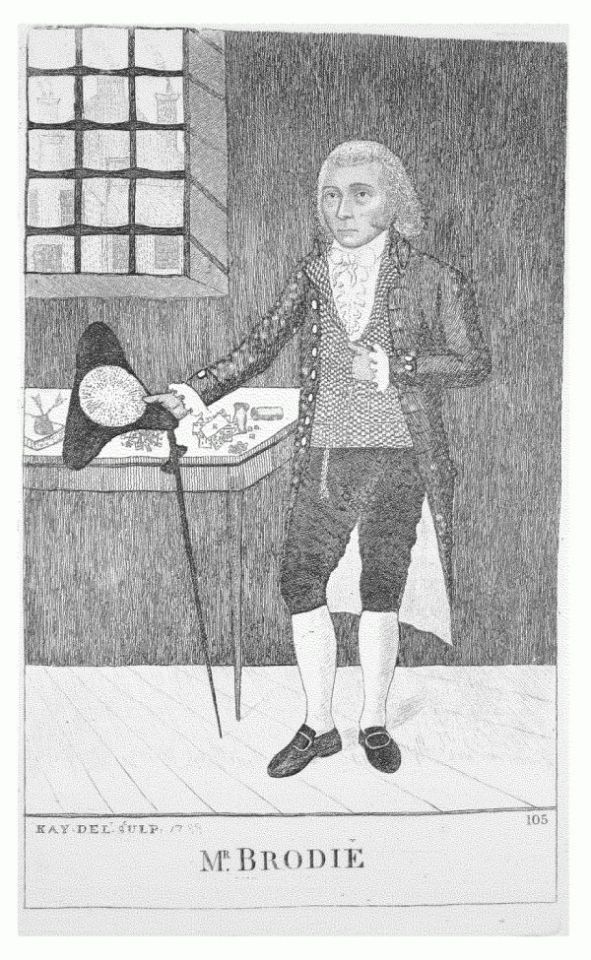
On August 27th 1788 the trial began of Deacon William Brodie, a respected pillar of Edinburgh society by day, a thief and housebreaker by night.
Brodie is said to have been the inspiration of Robert Louis Stevenson's Dr Jekyll and Mr Hyde, which was published a century later.
The prestigious title of deacon did not refer to religion, as many assume, but instead to his presidency of one of Edinburgh's trades guilds. His trade was as a cabinet-maker and his position as deacon of the Incorporation of Wrights made him a member of the town council.
The trial of William Brodie for breaking into and robbing the General Excise Office for Scotland took place at Edinburgh on 27th and 28th August, 1788. The story of his strange career is as enthralling as any romance. The double life which he so long and successfully led – as a respected citizen and town councillor by day, and by night the captain of a band of housebreakers – was the wonder of the country at the time. Nowadays you would call it a celebrity trial.
Brodie was quite rich with 10,000 pounds and three houses that he inherited from his father. He also inherited the business, allowing him to sustain the wealth. Traveling in the highest social circles, Brodie had the key to almost all of the richest people’s houses. Literally. No wealthy Edinburgh resident would ever think that such a respected man would keep a copy of their key in his drawer and that he would slip inside their homes after nightfall to steal everything worth taking.
During the day, he was a well-known gentleman who shared jovial times with his rich customers and enjoyed the company of highly respected persons such as himself, but during the night, Brodie could be found gambling in the dark corners of Edinburgh, accruing debts that forced him to consider a life of crime, and so, he became a thief.
After installing a lock in a rich man’s home, Brodie would also make a copy of the key for himself. Not because he collected souvenirs, but because he intended to visit those homes again, some other night when a burglary without breaking in but entering the house with a key would be his tactic. In this way, the man had supplemental payment to support his double life as a gentleman by day and a gambler in the evenings. On top of everything, Brodie had to support his five children by two mistresses who didn’t know of each other’s existence.
Allegedly, his criminal career began around 1768, when he stole 800 pounds from a bank that he sneaked into during the night by using a key. The Deacon’s nightlife was filled with gambling, robbing, and stealing. He didn’t mix his daily business and finances with his nightlife. Whenever he would fall into debt while gambling, he had the “ace key” that would pay off his debts.
Another source says that although Brodie had already robbed a bank, his real criminal career began in the summer of 1786 when he met George Smith, an Englishman. Brodie and Smith got into business together, targeting the rich people’s homes in Old Town. By the end of that same year, the duo had successfully robbed a tobacconist and a goldsmith’s.
Soon, the Deacon and the Englishman recruited two other members to their group: Andrew Ainslie, a shoemaker, and John Brown, a thief. In 1787, the gang stole tea from a grocer’s store in Leith. Back then, tea was a valuable commodity, a luxury that only members of the elite could afford to buy.
Encouraged by their success, the gang, led by the Deacon, decided to steal the revenues of Scotland from an Excise office in Chessel’s Court on the Canongate. They organized an armed raid, and for the first time, instead of welcoming themselves inside with a key, they broke in. However, they managed to steal only 16 pounds when they were caught. The unsuccessful robbery led Brown to claim the King’s Pardon the same night and named Smith and Ainslie as the culprits.
When his partners got arrested, Brodie traveled to London, and from there he boarded a ship to Amsterdam. But, since there was a reward for Brodie, he was tracked down in Holland and shipped back to Edinburgh. He and his friend Smith were tried on August 27, 1788. Although at first there wasn’t any strong evidence against Brodie, he was convicted after a disguise, pistols, and of course, copied keys were found in his workshop.
After a trial that lasted only 21 hours, Brodie was hanged in front of 40,000 people on October 1st that very year.
You can read an account of his trial here https://archive.org/stream/trialofdeaconbro00brod/trialofdeaconbro00brod_djvu.txt
8 notes
·
View notes
Photo

Half of what makes being a professor fun is wearing eccentric outfits and looking absolutely gay (affectionate) in them.
#personal#actually me#real life Dr. Hyde (without the crime)#do not reblog#likes encouraged!#professors of tumblr#I may be an adjunct but being called Professor [Avant] is super neat#avant's adventures in academe
7 notes
·
View notes
Text
Profile Of A Sociopath
Glibness and Superficial Charm
Manipulative and Conning
They never recognize the rights of others and see their self-serving behaviors as permissible. They appear to be charming, yet are covertly hostile and domineering, seeing their victim as merely an instrument to be used. They may dominate and humiliate their victims.
Grandiose Sense of Self
Feels entitled to certain things as "their right."
Pathological Lying
Has no problem lying coolly and easily and it is almost impossible for them to be truthful on a consistent basis. Can create, and get caught up in, a complex belief about their own powers and abilities. Extremely convincing and even able to pass lie detector tests.
Lack of Remorse, Shame or Guilt
A deep seated rage, which is split off and repressed, is at their core. Does not see others around them as people, but only as targets and opportunities. Instead of friends, they have victims and accomplices who end up as victims. The end always justifies the means and they let nothing stand in their way.
Shallow Emotions
When they show what seems to be warmth, joy, love and compassion it is more feigned than experienced and serves an ulterior motive. Outraged by insignificant matters, yet remaining unmoved and cold by what would upset a normal person. Since they are not genuine, neither are their promises.
Incapacity for Love
Need for Stimulation
Living on the edge. Verbal outbursts and physical punishments are normal. Promiscuity and gambling are common.
Callousness/Lack of Empathy
Unable to empathize with the pain of their victims, having only contempt for others' feelings of distress and readily taking advantage of them.
Poor Behavioral Controls/Impulsive Nature
Rage and abuse, alternating with small expressions of love and approval produce an addictive cycle for abuser and abused, as well as creating hopelessness in the victim. Believe they are all-powerful, all-knowing, entitled to every wish, no sense of personal boundaries, no concern for their impact on others.
Early Behavior Problems/Juvenile Delinquency
Usually has a history of behavioral and academic difficulties, yet "gets by" by conning others. Problems in making and keeping friends; aberrant behaviors such as cruelty to people or animals, stealing, etc.
Irresponsibility/Unreliability
Not concerned about wrecking others' lives and dreams. Oblivious or indifferent to the devastation they cause. Does not accept blame themselves, but blames others, even for acts they obviously committed.
Promiscuous Sexual Behavior/Infidelity
Promiscuity, child sexual abuse, rape and sexual acting out of all sorts.
Lack of Realistic Life Plan/Parasitic Lifestyle
Tends to move around a lot or makes all encompassing promises for the future, poor work ethic but exploits others effectively.
Criminal or Entrepreneurial Versatility
Changes their image as needed to avoid prosecution. Changes life story readily.
Other Related Qualities:
Contemptuous of those who seek to understand them
Does not perceive that anything is wrong with them
Authoritarian
Secretive
Paranoid
Only rarely in difficulty with the law, but seeks out situations where their tyrannical behavior will be tolerated, condoned, or admired
Conventional appearance
Goal of enslavement of their victim(s)
Exercises despotic control over every aspect of the victim's life
Has an emotional need to justify their crimes and therefore needs their victim's affirmation (respect, gratitude and love)
Ultimate goal is the creation of a willing victim
Incapable of real human attachment to another
Unable to feel remorse or guilt
Extreme narcissism and grandiose
May state readily that their goal is to rule the world
(The above traits are based on the psychopathy checklists of H. Cleckley and R. Hare.)
NOTE: In the 1830's this disorder was called "moral insanity." By 1900 it was changed to "psychopathic personality." More recently it has been termed "antisocial personality disorder" in the DSM-III and DSM-IV. Some critics have complained that, in the attempt to rely only on 'objective' criteria, the DSM has broadened the concept to include too many individuals. The APD category includes people who commit illegal, immoral or self-serving acts for a variety of reasons and are not necessarily psychopaths.
DSM-IV Definition
Antisocial personality disorder is characterized by a lack of regard for the moral or legal standards in the local culture. There is a marked inability to get along with others or abide by societal rules. Individuals with this disorder are sometimes called psychopaths or sociopaths.
Diagnostic Criteria (DSM-IV)
1. Since the age of fifteen there has been a disregard for and violation of the right's of others, those right's considered normal by the local culture, as indicated by at least three of the following:
A. Repeated acts that could lead to arrest.
B. Conning for pleasure or profit, repeated lying, or the use of aliases.
C. Failure to plan ahead or being impulsive.
D. Repeated assaults on others.
E. Reckless when it comes to their or others safety.
F. Poor work behavior or failure to honor financial obligations.
G. Rationalizing the pain they inflict on others.
2. At least eighteen years in age.
3. Evidence of a Conduct Disorder, with its onset before the age of fifteen.
4. Symptoms not due to another mental disorder.
Antisocial Personality Disorder Overview (Written by Derek Wood, RN, BSN, PhD Candidate)
Antisocial Personality Disorder results in what is commonly known as a Sociopath. The criteria for this disorder require an ongoing disregard for the rights of others, since the age of 15 years. Some examples of this disregard are reckless disregard for the safety of themselves or others, failure to conform to social norms with respect to lawful behaviors, deceitfulness such as repeated lying or deceit for personal profit or pleasure, and lack of remorse for actions that hurt other people in any way. Additionally, they must have evidenced a Conduct Disorder before the age of 15 years, and must be at least 18 years old to receive this diagnosis.
People with this disorder appear to be charming at times, and make relationships, but to them, these are relationships in name only. They are ended whenever necessary or when it suits them, and the relationships are without depth or meaning, including marriages. They seem to have an innate ability to find the weakness in people, and are ready to use these weaknesses to their own ends through deceit, manipulation, or intimidation, and gain pleasure from doing so.
They appear to be incapable of any true emotions, from love to shame to guilt. They are quick to anger, but just as quick to let it go, without holding grudges. No matter what emotion they state they have, it has no bearing on their future actions or attitudes.
They rarely are able to have jobs that last for any length of time, as they become easily bored, instead needing constant change. They live for the moment, forgetting the past, and not planning the future, not thinking ahead what consequences their actions will have. They want immediate rewards and gratification. There currently is no form of psychotherapy that works with those with antisocial personality disorder, as those with this disorder have no desire to change themselves, which is a prerequisite. No medication is available either. The only treatment is the prevention of the disorder in the early stages, when a child first begins to show the symptoms of conduct disorder.
THE PSYCHOPATH NEXT DOOR (Source: http://chericola57.tripod.com/infinite.html)
Psychopath. We hear the word and images of Bernardo, Manson and Dahmer pop into our heads; no doubt Ted Bundy too. But they're the bottom of the barrel -- most of the two million psychopaths in North America aren't murderers. They're our friends, lovers and co-workers. They're outgoing and persuasive, dazzling you with charm and flattery. Often you aren't even aware they've taken you for a ride -- until it's too late.
Psychopaths exhibit a Jekyll and Hyde personality. "They play a part so they can get what they want," says Dr. Sheila Willson, a Toronto psychologist who has helped victims of psychopaths. The guy who showers a woman with excessive attention is much more capable of getting her to lend him money, and to put up with him when he strays. The new employee who gains her co-workers' trust has more access to their chequebooks. And so on. Psychopaths have no conscience and their only goal is self-gratification. Many of us have been their victims -- at work, through friendships or relationships -- and not one of us can say, "a psychopath could never fool me."
Think you can spot one? Think again. In general, psychopaths aren't the product of broken homes or the casualties of a materialistic society. Rather they come from all walks of life and there is little evidence that their upbringing affects them. Elements of a psychopath's personality first become evident at a very early age, due to biological or genetic factors. Explains Michael Seto, a psychologist at the Centre for Addiction and Mental health in Toronto, by the time that a person hits their late teens, the disorder is almost certainly permanent. Although many clinicians use the terms psychopath and sociopath interchangeably, writes psychopath expert Robert Hare on his book 'Without Conscience', a sociopath's criminal behavior is shaped by social forces and is the result of a dysfunctional environment.
Psychopaths have only a shallow range of emotions and lack guilt, says Hare. They often see themselves as victims, and lack remorse or the ability to empathize with others. "Psychopaths play on the fact that most of us are trusting and forgiving people," adds Seto. The warning signs are always there; it's just difficult to see them because once we trust someone, the friendship becomes a blinder.
Even lovers get taken for a ride by psychopaths. For a psychopath, a romantic relationship is just another opportunity to find a trusting partner who will buy into the lies. It's primarily why a psychopath rarely stays in a relationship for the long term, and often is involved with three or four partners at once, says Willson. To a psychopath, everything about a relationship is a game. Willson refers to the movie 'Sliding Doors' to illustrate her point. In the film, the main character comes home early after just having been fired from her job. Only moments ago, her boyfriend has let another woman out the front door. But in a matter of minutes he is the attentive and concerned boyfriend, taking her out to dinner and devoting the entire night to comforting her. All the while he's planning to leave the next day on a trip with the other woman.
The boyfriend displays typical psychopathic characteristics because he falsely displays deep emotion toward the relationship, says Willson. In reality, he's less concerned with his girlfriend's depression than with making sure she's clueless about the other woman's existence. In the romance department, psychopaths have an ability to gain your affection quickly, disarming you with words, intriguing you with grandiose plans. If they cheat you'll forgive them, and one day when they've gone too far, they'll leave you with a broken heart (and an empty wallet). By then they'll have a new player for their game.
The problem with their game is that we don't often play by their rules. Where we might occasionally tell a white lie, a psychopath's lying is compulsive. Most of us experience some degree of guilt about lying, preventing us from exhibiting such behavior on a regular basis. "Psychopaths don't discriminate who it is they lie to or cheat," says Seto. "There's no distinction between friend, family and sucker."
No one wants to be the sucker, so how do we prevent ourselves from becoming close friends or getting into a relationship with a psychopath? It's really almost impossible, say Seto and Willson. Unfortunately, laments Seto, one way is to become more suspicious and less trusting of others. Our tendency is to forgive when we catch a loved one in a lie. "Psychopaths play on this fact," he says. "However, I'm certainly not advocating a world where if someone lies once or twice, you never speak to them again." What you can do is look at how often someone lies and how they react when caught. Psychopaths will lie over and over again, and where other people would sincerely apologize, a psychopath may apologize but won't stop.
Psychopaths also tend to switch jobs as frequently as they switch partners, mainly because they don't have the qualities to maintain a job for the long haul. Their performance is generally erratic, with chronic absences, misuse of company resources and failed commitments. Often they aren't even qualified for the job and use fake credentials to get it. Seto talks of a patient who would get marketing jobs based on his image; he was a presentable and charming man who layered his conversations with educational and occupational references. But it became evident that the man hadn't a clue what he was talking about, and was unable to hold down a job.
How do you make sure you don't get fooled when you're hiring someone to baby-sit your child or for any other job? Hire based on reputation and not image, says Willson. Check references thoroughly. Psychopaths tend to give vague and inconsistent replies. Of course the best way to solve this problem would be to cure psychopaths of their 'illness.' But there's no recipe for treating them, say psychiatrists. Today's traditional methods of psychotherapy (psychoanalysis, group and one-on-one therapy) and drug treatments have failed. Therapy is more likely to work when an individual admits there's a problem and wants to change. The common problem with psychopaths, says Sets, "Is they don't see a problem with their behavior."
Psychopaths don't seek therapy willingly, says Seto. Rather, they're pushed into it by a desperate relative or by a court order. To a psychopath, a therapist is just one more person who must be conned, and the psychopath plays the part right until the therapist is convinced of his or her 'rehabilitation.'
Even though we can't treat psychopaths effectively with therapy, it doesn't mean we can't protect ourselves, writes Hare. Willson agrees, citing the most important factor in keeping psychopaths at bay is to know your vulnerabilities. We need to "realize our own potential and maximize our strengths" so that our insecurities don't overcome us. Because, she says, a psychopath is a chameleon who becomes "an image of what you haven't done for yourself." Over time, she says, "their appearance of perfection will begin to crack," but by that time you will have been emotionally and perhaps financially scathed. There comes a time when you realize there's no point in searching for answers; the only thing is to move on.
Taken in part from MW -- By Caroline Konrad -- September 1999
THE MALIGNANT PERSONALITY:
These people are mentally ill and extremely dangerous! The following precautions will help to protect you from the destructive acts of which they are capable.
First, to recognize them, keep the following guidelines in mind.
(1) They are habitual liars. They seem incapable of either knowing or telling the truth about anything.
(2) They are egotistical to the point of narcissism. They really believe they are set apart from the rest of humanity by some special grace.
(3) They scapegoat; they are incapable of either having the insight or willingness to accept responsibility for anything they do. Whatever the problem, it is always someone else's fault.
(4) They are remorselessly vindictive when thwarted or exposed.
(5) Genuine religious, moral, or other values play no part in their lives. They have no empathy for others and are capable of violence. Under older psychological terminology, they fall into the category of psychopath or sociopath, but unlike the typical psychopath, their behavior is masked by a superficial social facade.
If you have come into conflict with such a person or persons, do the following immediately!
(1) Notify your friends and relatives of what has happened.
Do not be vague. Name names, and specify dates and circumstances. Identify witnesses if possible and provide supporting documentation if any is available.
(2) Inform the police. The police will do nothing with this information except to keep it on file, since they are powerless to act until a crime has been committed. Unfortunately, that often is usually too late for the victim. Nevertheless, place the information in their hands.
Obviously, if you are assaulted or threatened before witnesses, you can get a restraining order, but those are palliative at best.
(3) Local law enforcement agencies are usually under pressure if wealthy or politically powerful individuals are involved, so include state and federal agencies as well and tell the locals that you have. In my own experience, one agency that can help in a pinch is the Criminal Investigation Division of the Internal Revenue Service or (in Canada) Victims Services at your local police unit. It is not easy to think of the IRS as a potential friend, but a Swedish study showed that malignant types (the Swedes called them bullies) usually commit some felony or other by the age of twenty. If the family is wealthy, the fact may never come to light, but many felonies involve tax evasion, and in such cases, the IRS is interested indeed. If large amounts of money are involved, the IRS may solve all your problems for you. For obvious reasons the Drug Enforcement Agency may also be an appropriate agency to approach. The FBI is an important agency to contact, because although the FBI does not have jurisdiction over murder or assault, if informed, they do have an active interest in any other law enforcement agencies that do not follow through with an honest investigation and prosecution should a murder occur. Civil rights are involved at that point. No local crooked lawyer, judge, or corrupt police official wants to be within a country mile if that comes to light! It is in such cases that wealthy psychopaths discover just how firm the "friends" they count on to cover up for them really are! Even some of the drug cartel biggies will scuttle for cover if someone picks up the brick their thugs hide under. Exposure is bad for business.
(4) Make sure that several of your friends have the information in the event something happens to you. That way, an appropriate investigation will follow if you are harmed. Don't tell other people who has the information, because then something bad could happen to them as well. Instruct friends to take such an incident to the newspapers and other media.
If you are dealing with someone who has considerable money, you must realize that they probably won't try to harm you themselves, they will contract with someone to make the hit. The malignant type is a coward and will not expose himself or herself to personal danger if he or she can avoid it.
1 note
·
View note
Text
About Bruce Banner
Mixed MCU/Comics Earth 616 canon/Own Headcanons
Name: Robert Bruce Banner
Parents: Brian and Rebecca Banner
Birthplace: Dayton, Ohio
Early Days
His physically and emotionally abusive, alcoholic father Brian was convinced he’d passed a monster gene to Bruce and that Brian’s own experiments with radiation before Bruce was conceived had mutated his own son.It’s unclear if Brian thought the gene had skipped himself or if he, too, had it. Regardless, Brian had never wanted children.
For Bruce’s 4th Christmas, Rebecca gifted him a complex construction toy kit. He built it without the instructions. Brian perceived Bruce’s intelligence as unnatural and further proof his son was a monster.
Rebecca never understood Brian’s actions towards their son.Rebecca set into motion plans to leave Brian for good.Bruce would later say his mother saved him more times he could count and one of his deepest regrets is he wasn’t able to save her when it mattered the most.
Brian Banner killed his wife Rebecca when she and Bruce acted on their plan to leave him. He killed her in front of their son.
Brian made Bruce lie at his trial. He threatened him by saying he might go to jail, but that Bruce would burn in hell for betraying his own father. Later, he drunkenly boasted about threatening Bruce and was locked in a psychiatric institution for the crime anyway.
Bruce was raised by his paternal Aunt Susan. She noticed he had an imaginary friend when he was younger, but chalked it up to childish imagination. Bruce was normally a reserved and seemingly calm child. Too reserved sometimes.Brian’s venom and toxic words still burned, but Bruce rarely expressed his anger.
His Aunt Susan described it as white-hot and brief—Bruce would be transformed screaming unintelligible things, scribbling hard enough to rip pages in his notebook,but once it flashed, it faded. He’d apologize. And he never hurt anyone. She kept her distance in those moments. She understood them all too well.
She felt it too when she remembered her own father, her brother, and even herself. But she’d tell Bruce, “You’re you, not them. You’re my nephew. And Rebecca’s son, too. We are more than these moments.”
Bruce would find some comfort in this. And he tried to immerse himself in better things: science, creation, what the world was made of and it’s miracles.
The combination of rarely effusive with his emotions, studious, and genius-level intellect didn’t make it easy for him to make many friends, but he valued the ones he had.
It wasn’t until he was older that he realized something was...off. Once in high school, he entered a room and his friends greeted him with congratulatory praise for defending Carl and decking a bully. He thought they were joking. That didn’t sound like him. There had been plenty of witnesses, but Bruce didn’t remember a single thing about it.
The bully stopped bothering them when Bruce was around. And another time, Bruce found himself washing blood from his knuckles in the bathroom. He didn’t protest when he was called to the principal’s office. His friends still defended him saying Charles Rolfe had been out of line and Carl didn’t stand a chance and they asked why Bruce didn’t tell his Aunt or their teachers he’d stopped the fight and hadn’t started it.
But, how would he know if he’d done the right thing if he hadn’t done it? He didn’t remember doing it. How was he suppose to explain that?
And it was worrying his Aunt. That’s what he hated the most. She’d never asked for this. He’d tried to be good. They’d had a plan. Suspension for fighting wasn’t part of it. What about scholarships? What about college? The kind he wanted to attend weren’t cheap.
But Rolfe was a menace and Carl wound up in a hospital bed with a broken arm and black eye. And Bruce tried to promise his Aunt he wouldn’t do anything. But one morning he woke up in the high school basement, wire strippers in his pocket and he’s running to Rolfe’s homeroom desk and he can’t explain WHY he’s defusing a freaking bomb. He knows why he knows how to defuse it but he doesn’t remember freaking building it. But no one believes him.
No one but his Aunt.
Thaddeus Ross takes an interest in his education because of the bomb and convinces the police to drop the charges if Susan and Bruce agree to leave town. It’s the only silver lining.
Because his Aunt agrees they need to figure out what’s going on. There’s a name for what he has and back then it was called Multiple Personality Disorder. Nowadays, it’s called Dissociative Identity Disorder or DID. Not that it matters what it’s called.
“One of dad’s many gifts,”Bruce would sigh much, much later.
He learns to manage it. And it’s not something he leads with in conversations with new people.
He excels at academics, but his personal life falls to the wayside. Science is safer than socializing. One of his girlfriends, Angela, was concerned about how he wasn’t physically affectionate and didn’t touch her. It was hard to explain so it didn’t last long.
He can explain gamma radiation and it’s uses to help heal, but no one is interested in funding that. He has medical knowledge, but the military pays so Bruce feels he has to sell his soul.
Brian is “reformed” 15 years after Rebecca’s death and good man that he is Bruce still tried to let him stay with him.
Brian isn’t and attacks Bruce while he’s visiting his mother’s grave. And honestly, I think Rebecca Banner rose out of her grave for revenge and to protect Bruce because in the fight HOW does Brian die? His head hits her headstone. Bruce represses the memory.
He knows Brian is out of his life. And part of him knows what happened. He’ll find out later.
He unexpectedly manages something real with—of all people—Thaddeus Ross’ daughter, Elizabeth. She’s brilliant and beautiful and brave.
And Bruce successfully patents a number of devices and ideas, publishes and researches enough to wrack up a few Ph.Ds.
But The Other Guy takes all that away from him. It’s hard enough to love someone from a far, it’s harder still to love someone when a future together is impossible.
Origin of The Other Guy
I diverge from MCU here: Ross in The Incredible Hulk says Bruce didn’t know the real reason he was interested in Bruce’s work. I don’t buy that. Of course, Bruce would know Ross and the US military was interested in weaponizing his work. In the comics, Bruce works on the project reluctantly because he couldn’t get funding for the use of gamma rays for medical purposes.
Bruce saves Rick Jones from a gamma explosion. Igor Starsky was the Russian spy who pretended to be merely Bruce’s collegue and failed to stop the experiment when Bruce asked.
Experimenting on himself fits in better with Dr. Jekyll and Mr. Hyde parallel, but I don’t think hubris is as key to Bruce’s story. Is it part of it? Is Bruce capable of arrogance and bitterness and getting in over his head? Absolutely. I follow closer to comic book origins for Bruce’s earlier days so that element of Bruce and internal conflicts is already there.Bruce has enough instances of accidentally hurting people before and after Hulk.
And would Elizabeth go along with just watching Bruce experiment on himself? General Ross would, but he already has sketchy ethics.
If you say Bruce experimented on himself and that’s how he became the Hulk, he’ll assume the story got out of hand. But Bruce definitely experiments on himself later.
He uses the money he earns from his patents and inventions to sets up a fund for victims of Hulk’s rampages.
Avengers Assemble
Bruce is able to direct the Hulk for a while. Acknowledging his own anger and having an outlet placates Hulk for a while. But The Other Guy also has a chance to learn and feel and grow more.
And after Bruce crashes the quinjet, Sakaar is Hulk’s paradise. He isn’t feared. He can be loud and channel his violence and win praise and everyone seems to love him. Bruce? He’s tired and a break wasn’t the worst thing in the world, but then he couldn’t come back. The Other Guy wouldn’t let him.
And most of the time Bruce wishes The Other Guy wasn’t necessary, but he also knows that isn’t fair to Hulk. He can’t bring himself to hate him. He hates that he, Bruce Banner, is the one who has to regret and fear and loathe and...can’t be invincible. Hates that Hulk can be free and child-like and unburdened.
Bruce had wanted to be remembered for discoveries and creation and a meaningful life. Not destruction and turning into someone else.
3 notes
·
View notes
Note
What are Kilgrave's views on mortality?
SEND ME A TOPIC TO WRITE A META ON!
I’ll start off by saying that Kilgrave is not immoral. He is amoral. Immoral people have an understanding of right and wrong, and still choose to do “wrong” things. But amorality is different. Coined by Robert Louis Stevenson (of The Curious Case of Dr. Jekyll and Mr. Hyde fame) amorality is defined as simply having no moral compass at all. While moral people choose to do “good”, and immoral people choose to do “bad”, amoral people just disregard im/morality as a whole. Animals could be considered amoral, because they kill to eat, with no malice or evil intention. And Kilgrave is, arguably, amoral.
In this beautiful interview, David says “How do you have a conversation with anyone? How do you get on the same level with anyone? How do you build a moral framework?” He argues, the same as I do, that Kilgrave was incapable of building a moral framework with which to understand the concepts of “good” and “bad”, because everyone simply did what he told them. I tried to explore this in my self para about his teenage years. “There is no limit to what they do […] He learns quickly. There’s nothing they say no to. Nothing.” Kilgrave could never really understand other people complexly, because they were just cardboard cutouts who did whatever he asked them to.
How was he supposed to understand what “good” and “evil” was, what we consider as immoral, when people just did whatever he said, without question? They didn’t even make a sound as they committed these violent acts. Jessica went to cut her ears off, Simpson went to the edge of the balcony, without making a sound. They showed no signs of fear, no pain, no signs of distress. These hyper-violent acts just happened. Kilgrave couldn’t comprehend that these were “evil” acts, because people were complicit in their own crimes. They stabbed people, killed themselves, did whatever horrible thing he told them to, and he had no reason to think it mattered whether they wanted to or not.
Furthermore, Kilgrave has never suffered the consequences of his actions. An argument for the social necessity of morality is that it helps us to bond as a species. We’re nice to other people so they’re nice to us. It could be seen as a selfish act, a necessary thing so we help each other. But not so for Kilgrave. He has no practical use for morality, because every person he comes across just does what he says anyway. He has no social need to be good, or understand why being good matters. He lives, as I’ve said before, in a state of moral ambiguity. His life is like a dream, in that it’s so surreal. He never has to apologise, stay in one place, pay for things, or really worry about anything. His every need has been met. He has no reason to be “nice” to people.
Kilgrave’s own view on what constitutes as “evil” is actually really interesting. He says to Jessica “It’s true that I’ve never given a second thought to anyone that I’ve let die, but I take no pleasure in it like a truly evil man would.” So, his view of evil doesn’t come from the acts, but from the enjoyment of those acts. He’s sent countless people to their deaths, but he’s not evil, in his eyes, because he wasn’t doing it out of sadism. You can let someone bleed to death right in front of you, but if you don’t enjoy it, you’re not evil.
He lets himself off the hook by saying he’s not evil, because, according to him, Jessica’s view of evil is “reductive”. In calling him “evil”, she is positioning herself as “good”, which he thinks is rubbish. Not only has she hurt him by rejecting him, but she’s murdered people with her bare hands. Kilgrave avoids responsibility for his actions by saying that he didn’t do them personally. He has never killed anyone. They’ve killed themselves. So again, he is incapable of seeing that the suicides, rapes, thefts, murders, that he’s committed are his fault. Those people did the things he told them. He can’t see them as whole people. Again, amorality is abound. He is able to cause these evil acts and take no responsibility, because he has no moral compass at all.
His views are completely coloured by his power, and his childish and skewed perception of the world. He has no chance to develop a moral compass. He basically sees the world in black and white. His “selective conscience”, as he calls it, is basically “What do I want?” He is incapable of seeing beyond himself, of seeing anyone else as real.
3 notes
·
View notes
Video
youtube
Keshet Rewatches All of Scooby-Doo, Pt. 18: "Nowhere to Hyde"
("Scooby-Doo, Where Are You", Season 2 Episode 1. Original Airdate: 9/12/1970)
AKA, "The First One With a Song"
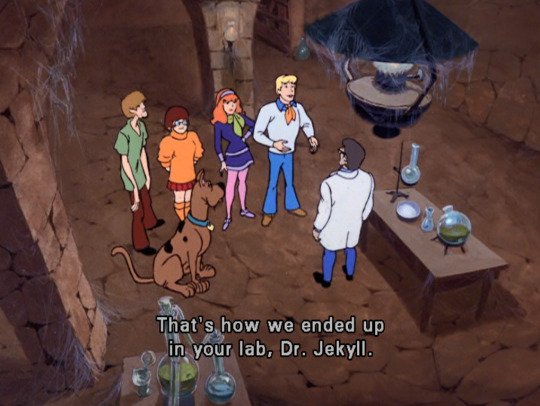
The episode opens on a nighttime view of the "Movart Collection", a display of expensive jewelry highlighting large gemstones. At the window, a ghoulish face appears, casing the joint. He slides open the window, steals a single enormous pendant, effortlessly climbs down the wall, and makes his escape as a police officer catches sight:
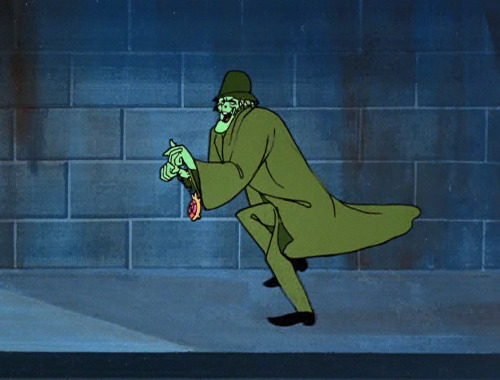
THE GHOST OF HYDE!
So, that's one of the oddities we're dealing with, in this episode, in this world of Scooby-Doo. It's the convention of fictional worlds that other works of fiction are real within them; Strange Case of Dr Jekyll and Mr Hyde is not a well-known novella by Robert Louis Stevenson, but a fact of history.
The scene cuts to a malt shop, where the Mystery Machine is parked, and the Ghost of Hyde opens the back doors and sneaks inside. Fred, that terrible driver, has no sense of security, and has left the van unlocked.
Meanwhile, the gang have just received their orders. Five double-fudge sundaes, one with a pickle on top for Shaggy. After Fred says that they enjoyed the magic show at the high school (mind, not a confirmation that they have been going to classes, but merely that they attended an event there), Scooby declares that he wants to demonstrate his own magic trick: a disappearing act where he swaps Shaggy's ice cream from its bowl and onto his own sundae, and eats it in one go.
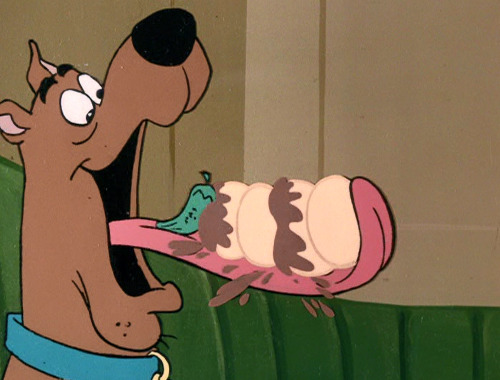
I will remind you that chocolate is fatal for dogs. But Scooby is clearly something other than a dog, so i suppose that's okay. For whatever reason, Shaggy’s pickle-on-top is also consistently drawn as a pickled pepper, and i can’t decide whether that makes this more or less appetizing.
The gang wrap things up, and settle into the Mystery Machine, driving who-knows-where as Fred takes a “creepy shortcut”. Unfortunately, the heater is busted, so Scooby reaches back for a beach blanket...
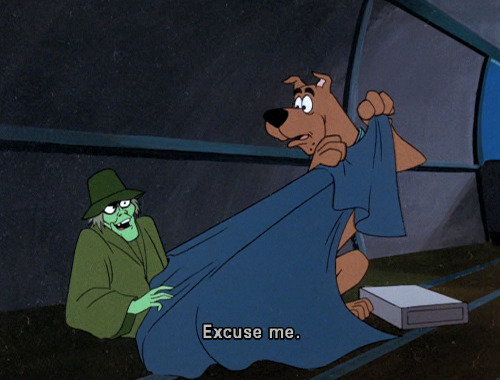
...which happens to be the hiding place of the ghost. As he rears up with a ghastly grin, the gang flip out, and stop the van to run and hide as the creep makes his escape. Velma recognizes him from the papers as the Ghost of Hyde, and the gang follow him to an old house. Shaggy’s not bothered at all by the situation, no.
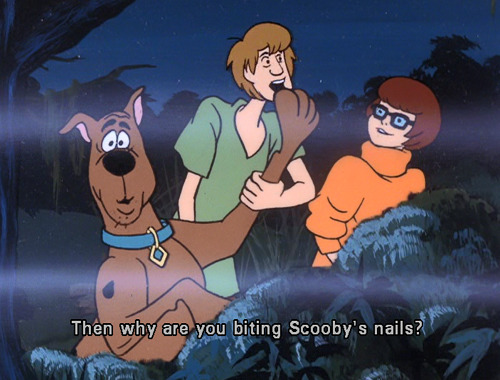
I’d say “you don’t know where those have been,” but you know exactly where those have been, and that makes this worse. Y’all just walked through a swamp.
A fall through a trap door puts the gang inside a laboratory belonging to one Dr. Jekyll, who enters and discovers them hiding. He explains that, after a test of a “vitamin formula you only have to take once in your life”, he started blacking out and awakening under circumstances that convinced him he was taking after his ancestor and turning into Mr. Hyde... the ghost of Mr. Hyde!
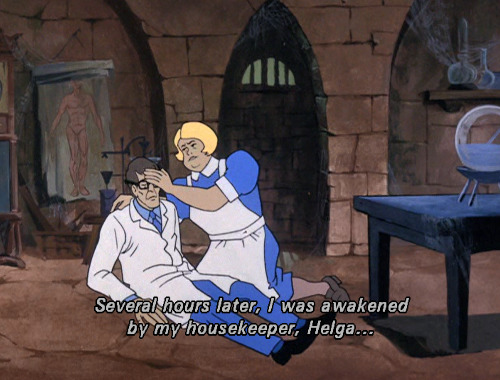
Danny Phantom, he ain’t.
The gang are convinced something’s fishy, because the mud on Dr. Jekyll’s shoes is dry, which makes no sense if he just transformed from the Ghost of Hyde, who was running through the marshlands near the house. The begin to investigate, with Shaggy and Scooby checking out the attic.
There’s a great gag where Scooby draws his paw across a particularly large web framed between some pieces of wood, and it produces a sound like the scales of a harp. Seconds later, Shaggy opens a “creepy old chest” to discover it’s full of live bats, though how they got in there will forever remain a mystery.
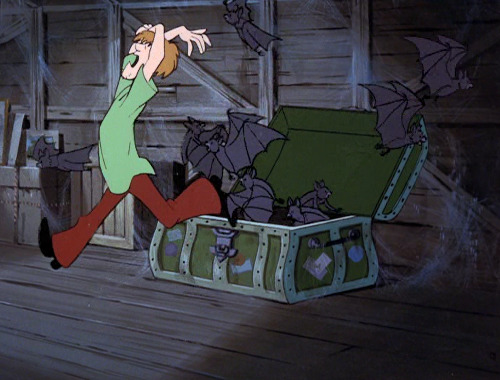
The bats are drawn even more adorably than usual. Investigating the rest of the chest’s contents suggests that “somebody around here must’ve been in show biz”, as it’s full of pieces of costumes. More investigation of the attic doesn’t go very far before the boys catch sight of a spooky shadow, and start to run around in a panic, trying different doors.
Scooby opens one to reveal... another, smaller door. Which hides another, behind which is yet another, which conceals one last tiny, tiny door.
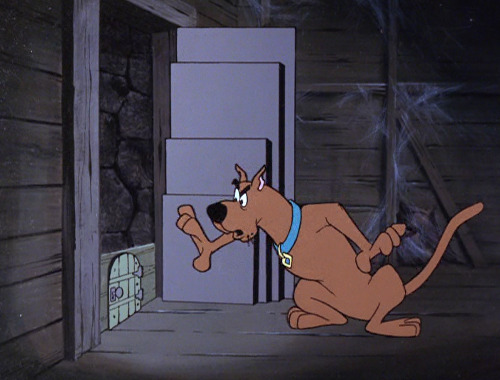
A mouse exits the door on its hind legs, squeaks angrily at Scooby while shaking a fist, and slams the door behind. We don’t have time to process the utter absurdity of this comedic non-sequitur (by which i mean, it’s a completely random gag that does not flow organically from the characters or situation and feels shoehorned into the episode for the sake of slapstick, there wasn’t even a second door visible in earlier shots) before the shadow reappears, and Scooby and Shaggy huddle together in a trembling panic.
Except it’s only Helga, the housekeeper. She assumes they’re “friends of the doctor”, with an air of disdain in her surprisingly pleasant and youthful voice—for a cartoon of the era, the way she’s drawn and the name she’s given would suggest an older voice. Her voice actress, Susan Steward, would also be involved in the writing of several songs in episodes later this season.
Helga complains that the boys “have made a mess of the attic, just after I finished cleaning it,” and begins to dust.
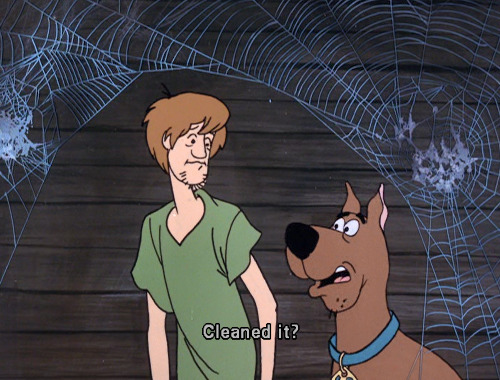
In contrast with the mouse door, it’s a gag that flows from the situation and characters: Scooby and Shaggy’s unease with “creepy” environments, the decrepit appearance of the house, and the air of mystery all combine to make it amusing while also adding to the idea of Helga as a suspect.
Meanwhile, the rest of the gang have found something in the fireplace, a scrap of old newspaper that it looked like someone was trying to burn.
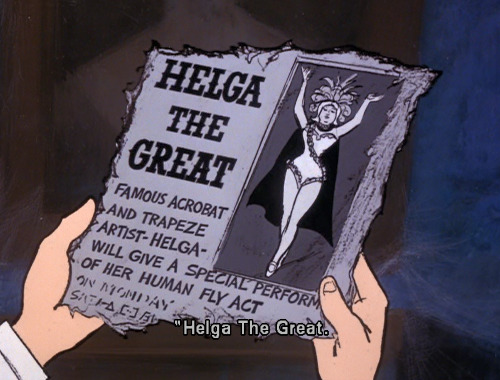
To be honest, while this makes Helga’s youthful, teen-like voice all the more dissonant, i want to draw your attention to the smudged “writing” at the very bottom. Part of that looks like it could say, “ON MONDAY”, but there’s even more that is not recognizable as even fragments of Latin letters. There’s a triangle, and a sort of [-] shape. These sorts of glyphs are so typical of newspapers and other on-screen writing not meant to be read, that i have to wonder about who was responsible for them. Was there a standard set of non-letters, or was it made up as they went along?
While Fred, Daphne, and Velma wonder about why someone who specializes in unassisted climbing of walls would be working as a maid in a place like this, the boys are busy in the Doctor’s library.
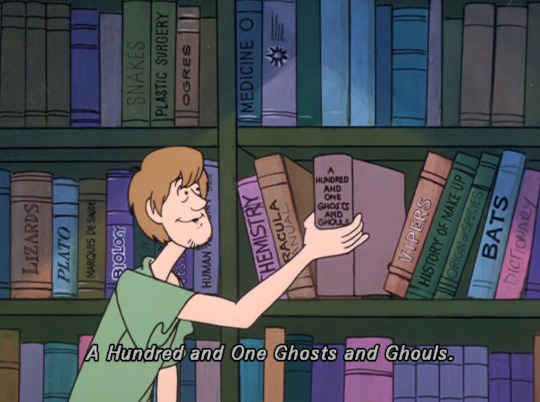
The episode does a lot to convince you that Helga is the Ghost of Hyde, but let’s be honest, that bookshelf settles Dr. Jekyll as the culprit without a doubt. We see books on Snakes, Plastic Surgery, Ogres, Medicine, Lizards, Plato, Marquis de Saude (sic), Biology, Murders in the Rue Morgue (obscured above by Shaggy), Chemistry, Dracula Manual, a Hundred and One Ghosts and Ghouls, Vipers, History of Make-Up, Origin of Species, and Bats. So, various works of horror, books on stereotypically “creepy” animals, and several more on outright monsters as well as a couple on changing your appearance.
Shaggy doesn’t have time to contemplate the obvious clues the background artists are providing, however, as the Ghost of Hyde is, well, hiding behind the first book he pulls. As they run and hide, the boys try a deception of hiding inside a broken television and playing at being actors on-screen, including a regrettable bit of Shaggy as a 19th century soldier and Scooby as a native complete with feathered headband. The deception doesn’t last, but their flight leads to another “clue”, as Velma insists that Hyde couldn’t have been Jekyll, since she and the others just saw him in his study—and Scooby finds a feather duster, pair of muddy shoes, and green jacket hidden on a fold-out ironing board in the basement.
As the rest of the gang follow the clues and investigate Helga’s room—finding a can of phosphorous paint (an absolutely nonsense “clue”, since the ghost never glows visibly) and a bottle of “knockout drops”—Shaggy waits outside and raids a bowl of fruit. Freddy, Velma, Daphne are convinced they’ve solved the mystery, but Shaggy interrupts...
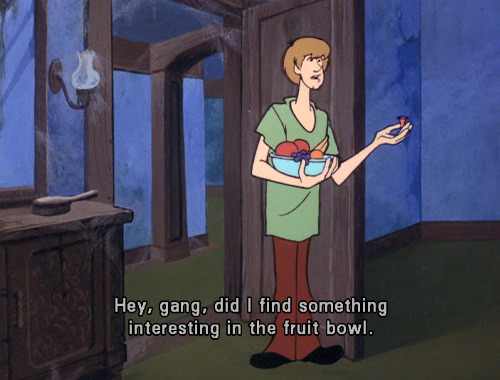
...and the Ghost of Hyde snatches him from behind! While the gang hunt the house to rescue him, Shaggy finds himself strapped to a table in the basement, where the madly laughing Hyde gestures to a book to indicate he plans to use the Doctor’s chemicals to turn Shaggy into a frog. Or, as Shaggy puts it, “croak me”.
He screams the series title in despair, and so begins the very first musical chase scene! “Recipe for My Love”, a performance credited to George A. Robertson, Jr., who also sang the new opening theme and was better-known for his musical career as Austin Roberts.
As Shaggy and Scooby crash back into the house, Freddy wonders why the Ghost was after Shaggy in the first place, when the rest of the gang was holding all the clues.
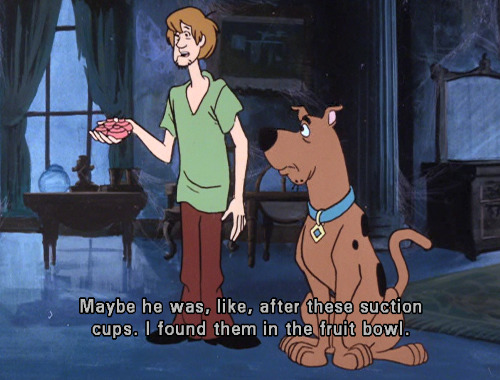
The others shrug it off, concluding that “the Ghost of Hyde is a 24-carat phony” (what????) and that they know who he really is.
A 24-carat phony? Did that line make sense in the Seventies?
The boys bait Hyde, luring him to pull apart a curtain, which reveals... another Ghost of Hyde!
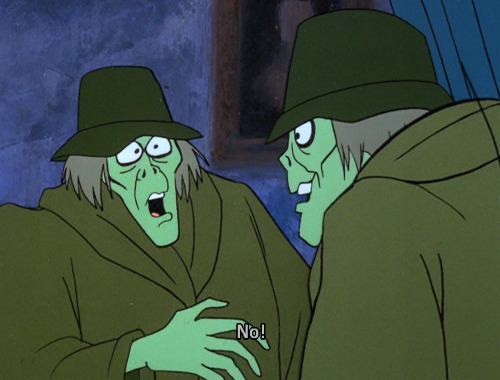
Fleeing, he encounters another, with an oddly high-pitched laugh, and a peculiarly petite one who offers a familiar-sounding “boo!” before he runs in terror, screaming about GHOSTS! Velma, Daphne, and Fred remove their Hyde masks in triumph as they watch the original run back towards the very same trap door that caught them when they first arrived, sending the Ghost of Hyde crashing down into...
THE FIRST TRAP THAT EVER WORKED RIGHT
But there’s still a twist. “If our calculations are right, it should be Helga, the housemaid,” Velma says, as smugly as possible
Well, you win some, you lose some.
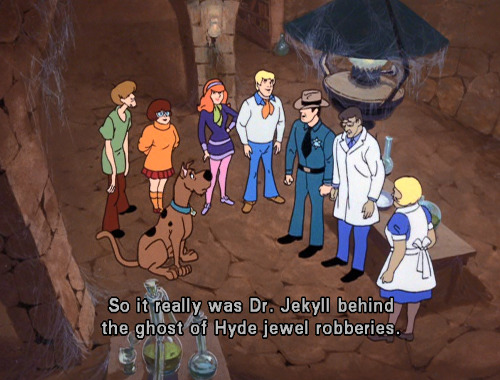
Fred explains that the Doctor’s repeated failures in utter unscientific nonsense led him to turn to a life of crime, hastily coming up with the idea of framing his maid and coming up with fake clues while hiding the genuine ones—the suction cups he used for wall-crawling, which Helga wouldn’t have needed.
As the episode ends without commentary on the fact that, while this Dr. Jekyll faked his transformation, there was apparently an actual historic Mr. Hyde, the culprit sulks, his head hung in shame.
There will be no “meddling kids”. Will there ever?
(like what i’m doing here? It’s not what pays the bills, so i’d really appreciate it if you could send me a bit at my paypal.me or via my ko-fi. Click here to see more entries in this series of posts, or here to go in chronological order)
12 notes
·
View notes
Text
Decriminalizing Drugs
Drug use is everywhere, legal, or not. You may not notice it, but I do. You walk down the street, the subtle handshake then a slip into the pocket. It is a quick interchange between two people. Everybody knows there are drug dealers and drug addicts. They could be our neighbors, or even the people we work with. These people have families. These people could have been born with a drug addiction. You never know a person’s real reasoning for something they do. Even if they do, you still do not know what they are going through. We should not be punishing people for something they cannot help. Addiction is a very dangerous thing. You can get addicted to anything. Alcohol, for example, is legal and socially accepted. You can get addicted to it, but not sent to jail. I have seen people struggle to get off an addiction to heroin and sent to jail. Their family torn apart and their kids in the foster system. Those people are sent to jail to die from withdrawal. Yet, an alcohol addiction, which is just as bad, they get all the support they need for rehabilitation.
Ron Clark, age sixty, was a heroin addict. He was never sent to jail, but he was kicked out of two different rehabilitation centers. Clark was a laborer and when jobs were available, he would miss his drug rehab appointments and the clinics refused to give him refills. He relapsed and returned to using heroin without his medications (The Marshall Project).
The United States began to look at drug use and sales as a huge issue in the late 1880s, early 1910s. The Supreme Court ruled that the state governments could not regulate interstate trade in 1886. The responsibility was left to the federal government, and they did not do anything about it (ThoughtCo). Drug use is still a huge problem to this day. To help people like Mr. Clark, the United States must treat drug use as an issue of public health rather than a crime because there should be alternative options to drug addiction, drug laws criminalize users, recreational use is the person’s choice, people believe all drugs cause violent behavior, and decriminalization will help with drug regulation.
Opponents to treating drug use as a mental illness rather than a crime argue that decriminalization will cause violent crime and convince people to do drugs. They claim that Studies have shown that long-term users of amphetamine, methamphetamine, and especially cocaine tend to exhibit hostile and aggressive behavior. Psychotropic substance abuse may also be the result of the so-called "cocaine psychosis." As the dose and duration of cocaine use increase, the development of psychopathology associated with cocaine is common. Cocaine psychosis usually occurs before the transition period, which is characterized by suspicion, compulsive behavior, and delusions. People can experience visual and auditory hallucinations through distressing sounds they often hear. Many people think that they are being monitored by the police or that family, friends, and others are acting against them (Inciardi and Saum). Opposers also believe that decriminalizing drugs will push people to take drugs. However, recreational drug use is a person’s choice. The government does not have a say in what people do in their everyday lives. The government can push for a drug free country, but they cannot enforce it. Opponents also argue that the law enforcement is already effective in lowering the availability of drugs to the public.
One reason the United States should treat drug use as a mental illness rather than a crime is that there are alternative options to drug addiction that are more helpful than prison time. There are many treatment facilities that are cheaper than jail. According to The Marshall Project, there are about forty thousand people (about twice the seating capacity of Madison Square Garden) each year who die from opioid-related overdoses and about a million or more-need access for treatment and most are not getting it. The Marshall Project states, “In a half-dozen studies, when researchers compared patients taking the medications to those receiving counseling alongside the medications, both groups refrained from opioids at similar rates.” With drug decriminalization, more people will be able to get the help they need instead of going to prison. When a person is thrown into prison for drug possession and use, they are not seen as a mental health issue. They are seen as a bad person who is a bad influence on other people.
Another reason that drug use should be treated like a mental illness is that drug laws criminalize users. According to the article “Drug Legalization”, “To earn the money needed to afford more drugs, addicts often resort to prostitution, larceny, or violent crimes such as assault or arson.” The effects or criminalization is very subtle. If a person is criminalized for drug use, they cannot get something as simple as a job. According to Barnett, “This increases still further the likelihood that the artificially high prices of illicit drugs will lead drug users to engage in criminal conduct to obtain income...Once this threshold is crossed, there is often no return. Such a choice would not be nearly so compelling if prohibited substances were legal.” Drug users are also held as a way law enforcement can get more information on other drug sellers and users. The law enforcement will illegally bribe them with money to be an informant (Barnett). This is more dangerous to that person than taking drugs. The informant’s potential life and family could be in danger.
Not only drug laws criminalize users, but recreational drug use is also a person’s choice. The government should not have a say in what people do in their everyday lives. If the government cared about drug use, our illegal drug use laws would not be outdated. In the 1970s, drug abuse was seen primarily as a social disease and was addressed with treatment. After the 1970s, drug abuse was seen instead as a law enforcement and was addressed with aggressive criminal justice policies (ThoughtCo). This shows that the government has failed on treating illegal drug use after the 1970s. The government just got lazy with trying to fix the issue.
Non-drug users believe drug use causes violent behavior. This however, is untrue. According to Husak, “Dr Jekyll consumed a potion that transformed him into the homicidal Mr. Hyde. The psychopharmacological effects of this potion caused an otherwise law-abiding physician to become a violent monster. Of course, this story is purely fictitious. If any existing drug resembled the potion in this story, we would have excellent reasons to criminalize its use.” People compare drug use to this story. They compare drug use to a fiction story that is used to scare people. This proves that people are more paranoid about drugs. Another point Husak states is that people under the influence of heroin are more passive than violent due to their psychopharmacological properties. People are more likely to commit a psychopharmacological crime when they drink alcohol.
In addition, we should treat drug use as a mental illness because decriminalization would help with drug regulation. When a person is prescribed an illegal drug, the federal government will target the prescribed medication as illegal and arrest the person instead of the doctor who prescribed the medication. Legalizing drugs will help the problems linked to drug use. According to the Law Enforcement Against Prohibition (LEAP), “Drug legalization presents the opportunity to regulate production and distribution of these substances, resulting in a more effective and ethical way to deal with drug abuse than laws that encourage black market activity.” When drugs are illegal, trade is forced underground and controlled by cartels. Trade being underground leads to more crimes than preventing it.
Ron Clark claims that the use of buprenorphine has slowed his use of heroin (The Marshall Project). Decriminalizing drugs, people, like Ron Clark, will get the same kind of help. Drug use should be treated as a mental illness because rehab is a choice, laws criminalize users, we would be able to regulate the drugs better, drugs do not cause violent behavior, and drug use is a person’s choice. Every day, people are being arrested and sent to jail for drug use. This is causing overcrowding. People should all come together and push for the decriminalization of drugs. It is important to fight for the people who cannot.
Works Cited
Barnett, Randy E. "Legalizing Drugs Would Benefit Addicts and Society." Addiction, edited by Jennifer A. Hurley, Greenhaven Press, 2000. Opposing Viewpoints. Gale In Context: Opposing Viewpoints, link.gale.com/apps/doc/EJ3010103230/OVIC?u=23870&sid=OVIC&xid=72e6cc0a. Accessed 20 Apr. 2021. Originally published as "Curing the Drug-Law Addiction: The Harmful Side Effects of Legal Prohibition," Dealing with Drugs: Consequences of Government Control, edited by Ronald Hamowy, Pacific Research Institute, 1997.
"Drug Legalization." Gale Opposing Viewpoints Online Collection, Gale, 2021. Gale In Context: Opposing Viewpoints, link.gale.com/apps/doc/PC3010999286/OVIC?u=23870&sid=OVIC&xid=257efa81. Accessed 20 Apr. 2021.
Head, Tom. "A Short History of the 20th Century War on Drugs." ThoughtCo, 22 Jan. 2018, www.thoughtco.com/history-of-the-war-on-drugs-721152.
Husak, Douglas N. "Legalizing Drugs Would Reduce Crime." Legalizing Drugs, edited by Stuart A. Kallen, Greenhaven Press, 2006. At Issue. Gale In Context: Opposing Viewpoints, link.gale.com/apps/doc/EJ3010018216/OVIC?u=23870&sid=OVIC&xid=50a50789. Accessed 20 Apr. 2021. Originally published in Legalize This! The Case for Decriminalizing Drugs, Verso, 2002.
Inciardi, James A., and Christine A. Saum. "Legalization of Drugs Would Increase Violent Crime." Legalizing Drugs, edited by Louise I. Gerdes, Greenhaven Press, 2001. At Issue. Gale In Context: Opposing Viewpoints, link.gale.com/apps/doc/EJ3010018206/OVIC?u=23870&sid=OVIC&xid=54be2a0d. Accessed 20 Apr. 2021. Originally published as "Legalization Madness," The Public Interest, Spring 1996.
Schwartzapfel, Beth. "Treatment for Opioid Addiction, With No Strings Attached." The Marshall Project, The Marshall Project, 10 May 2019, www.themarshallproject.org/2019/05/10/treatment-for-opioid-addiction-with-no-strings-attached.
0 notes